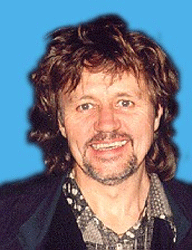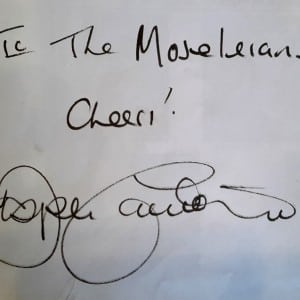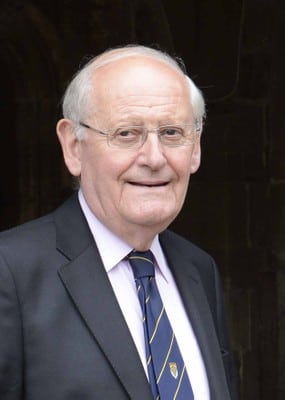Moseley's Hall Of Fame
Moseleians have gone on to make a name for themselves in many walks of life including sports, business, religion, music, politics, TV, radio and stage.
ALLEN, Rod aka Rodney Bainbridge, The Fortunes, Musician
BELL, David, Mayor of Solihull 2008/9
BENSON, Lee, Author and Musician
BURGESS, Stuart (Rev Dr), The Highest Office in the Methodist Church
CARROTT, Jasper OBE aka Bob Davies, Comedian
CARTHEW, Anthony, ITN News Reporter
CHAUDHRY, Nisar, International Sportsman
CHINN, Carl (Prof) MBE, Historian & Broadcaster
CORBETT, Sharon Commonwealth Sportswoman
COTTRELL, Sir Alan, Fellow of Jesus College, Cambridge
GIBBONS, Geoffrey (Dr) Lawyer, Judge & Organist
HAGUE, Sir Douglas Hague, Economist
HATHAWAY, Derek OBE, Businessman
LUKE, Noel, Football League Player
LUMBY, John (Dr), Industrialist and Inventor
LEWIS, Mickey, Football League Player & Manager
MALIN, Joanne, Radio and TV Presenter
MASDING, John (Rev), Chairman of the English Clergy Association
MASSEY, Roy MBE (Dr), Organist
McGOWRAN, Peter, Chief Yeoman Warder HM Tower of London
MOLESWORTH, Paul, Football Scout
PRITCHARD, Barry, The Fortunes, Musician
ROUSE, Steve, Edgbaston Head Groundsman
SALEH, Amerah, Spoken Word Artist
SAMUEL, Glyn, Chancellor of the diocese of Coventry
SLATER, Daphne, Olympic Sportswoman
SMALL, Gladstone, International Cricketer
SOLOKOVIĆ, Mirsad, Author and Actor
TAYLOR, John David Becket, Politician
WHITTINGTON, Ian, Fellow of the Australian Society for Parasitology
If you know of other please let us know
Here are short biographies of some...
Kabir Ali
Sportsman
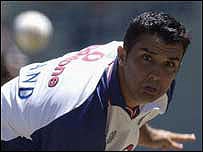
Kabir AliKabir Ali was born in 1980 in Moseley, Birmingham and attended Moseley School. He went on to study at Wolverhampton University.
In his cricket career he has has great sucess at both county and iinternational level playing for England, England A, England NCA XI, Marylebone Cricket Club, Rajasthan, Worcestershire and Worcestershire Cricket Board.
Outside of cricket Kabir has pursued an active modelling career.
Rod Allen
Lead Singer with The Fortunes
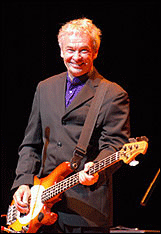 Rod AllenThe Fortunes were one of many pop groups that rose to prominence in the wake of the Beatles. Their speciality was softer ballads delivered in three-part harmonies underpinning the voice of Former Rod Allen, who led the group for more than 40 years. He has died of cancer, aged 63.
Rod AllenThe Fortunes were one of many pop groups that rose to prominence in the wake of the Beatles. Their speciality was softer ballads delivered in three-part harmonies underpinning the voice of Former Rod Allen, who led the group for more than 40 years. He has died of cancer, aged 63.
He was born Rodney Bainbridge in Leicester, where his parents were shopkeepers. His interest in popular music was fired by skiffle, in particular by the voice and guitar of Lonnie Donegan, whose fan club he joined at the age of 12.
When he was 14, the family moved to the Sparkbrook district of Birmingham and Rod attended Moseley grammar school. After working for the Co-operative Insurance Society for 18 months, he became a full-time musician. He had formed an acoustic guitar group, the Clifftones, with friends Glen Dale and Barry Pritchard. In 1963 they went electric, with Rod mastering the bass guitar; they added a drummer and keyboards player. They were managed by the flamboyant concert promoter Reg Calvert, who prevailed upon them to accompany a singer Calvert had renamed "Robbie Hood". The Clifftones inevitably became the Merry Men, dressed in jerkins and green tights.
They emerged at the end of this period as the Fortunes Rhythm Group. By now, Rod had dropped the name Bainbridge and chosen Allen from a telephone directory. They worked up a series of songs associated with Dionne Warwick, Gene Pitney and Broadway theatre. So eclectic was their repertoire that Calvert would often challenge an audience: "Name any tune and if the Fortunes can't play it, you win five shillings!"
In 1963, they won a beat contest at the Gay Tower Ballroom in Edgbaston and were signed by Decca. The Fortunes' second single for the label was the plaintive ballad Caroline, which was adopted as a theme tune by the pirate radio station of that name. Calvert was also entangled in the shadowy world of pirate radio, and was shot and killed in 1966 as a result of rivalry with another pirate station owner.
The Fortunes' first hit was in 1965, when You've Got Your Troubles reached No 2 in Britain and No 7 in the US. The song, composed by leading Tin Pan Alley writers Roger Greenaway and Roger Cook, featured Allen's soaring lead vocals, as did the follow-up hit, Here It Comes Again. The group then toured the US and released This Golden Ring on their return. It reached the Top 20.
Although its success was slightly marred when the Fortunes admitted in a magazine interview that they had not played the instruments on the recording, they were booked to appear at the prestigious NME Poll Winners Show at Wembley Arena, where they performed This Golden Ring before several thousand screaming teenagers.
The Fortunes issued a further 10 singles in the 1960s. None was a hit, although several featured songs written by Allen and other group members, the best of which was The Idol by Allen and Pritchard. Despite their lack of chart success, the band prospered by playing the cabaret club circuit and by recording jingles for several television and cinema commercials. The most distinctive of these was Allen's rendition of It's the Real Thing, the Coca-Cola theme.
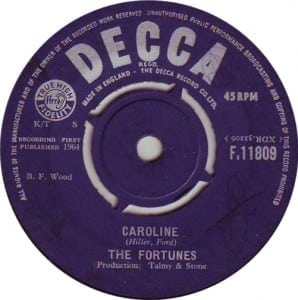 The band's recording career was briefly revived in the early 1970s, when Greenaway and Cook supplied them with two more hit songs, Here Comes That Rainy Day Feeling and Freedom Come, Freedom Go. These were followed by Storm in a Teacup, co-written by Lindsey De Paul and Barry Blue.
The band's recording career was briefly revived in the early 1970s, when Greenaway and Cook supplied them with two more hit songs, Here Comes That Rainy Day Feeling and Freedom Come, Freedom Go. These were followed by Storm in a Teacup, co-written by Lindsey De Paul and Barry Blue.
These successes renewed demand for live appearances by the Fortunes and the group kept on in steady work right up to the present. Allen played his last show with the group at Yeovil last November, shortly after he was diagnosed with liver cancer. The Fortunes have a full engagement book for 2008, and the surviving group members have said that it was his wish that they should continue after his death. Allen is survived by his wife Margaret, son Leigh, daughter Sharon and three grandchildren.
Rod Allen (Rodney Bainbridge), musician, born March 31 1944; died January 10 2008
Source: www.guardian.co.uk
David Bell
Mayor of Solihull 2008/9
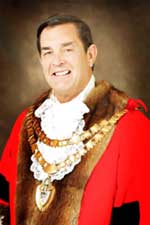
Born in Birmingham to Scots parents David lives in Berkswell, a part of the Meriden Ward which he has represented for 8 years.
A Chartered Surveyor he was educated at Moseley Grammar School 1959-66 and became Captain of School in his final year. David worked initially in Birmingham with day release at Matthew Boulton College before taking his Finals at West London College. At this time he served with the London Scottish Territorial Army and developed a modicum of proficiency at playing the Bagpipes.
Following a short period with Birmingham City Estates Department, he served as a volunteer with VSO in Tanzania at the Ministry of Lands in Dar-es-Salaam. Returning to the Midlands he joined a long established family firm of surveyors in Sutton Coldfield and eventually became Managing Partner prior to the firm being absorbed by General Accident.
David has been a lifelong member of the Birmingham and Midland Scottish Society, and was President in its Centenary Year 1988. He was Founder Member and former President of Sutton Vesey Rotary Club. He served on the local VSO Committee for 20 years with 10 as Secretary and has recently retired as Chairman of the Meriden Constituency Conservative Association. His hobbies include tennis, swimming and golf and walking. His walks have included two up Mount Kilimanjaro in 1972 and 2000 and a trek through the Himalayas in Nepal.
David served 19 years as a Solihull Councillor including seven years as Planning Committee Chairman and became an Honary Alderman. He is President of Meriden Conservative Association,a Governor of The Lady Katherine Leveson Trust in Temple Balsall and a trustee of Berkswell Charities.
Having served on many Committees across the Council and outside bodies David was a Scrutiny Chairman for 2 years followed by 4 years as Cabinet Member for Community Services and the Environment.
Bev Bevan
Musician, Drummer
"YOU ARE BOTH USELESS YOU'LL NEVER DO WELL IN THE WORLD!"
The Time = September 1956.
The place = Moseley School 1st. Form
The Speaker = Mr. Freeman, schoolteacher.
The subjects Two small boys sharing a desk; Bevan (B.) and Davies (R.), known to most of us as Bev Bevan and Jasper Carrott.
Bev tells the story: We sat next to each other for the next five school years and are still the best of friends. I lived in Stratford Rd. Sparkhill, over a shop, and cycled home every lunch time and evening. I hated rugger but loved soccer. I was top of the class at Art and English my only GCSE subjects! It was the start of the 60' s and my greatest claim to fame was coming to school one day in "rock & roll" attire. My blazer was lengthened to give a "draped" look; the tie was narrowed in half to be cool; trousers taken in to drainpipe width; white shirt had fake leopard skin collar and cuffs; fluorescent socks with winkle-picker shoes and my mane of Bry clreamed, swept back hair with the drooping "quiff1. Result? Sent home and suspended for a day , but a hero to many of the smaller boys! In spite of my rebellious ways, I was, and still am, immensely proud of my old school.
The first 'beat' group I ever saw were Moseley boys two years older than us "The Strollers", Bunny Bainbridge and Barry Pritchard (unhappily no longer with us) who went on to have several hit records as "The Fortunes".
My career as a drummer began at school; all the band members attended Moseley Trevor (Phillip) Ackrill, Ronnie Smith, Tony Lewis, Wongy Weiland and myself. As "The Senators" we were playing youth clubs, dances and sometimes seedy night clubs at night and attending school in the daytime. On leaving school "Jasper" and I got jobs together as trainee buyers at the Beehive department store in B'ham city centre (just like "Are you being served," of TV fame) before I left to turn pro. with Denny Laine and the Diplomats. Denny left us in 1964 to form the "Moody Blues" and I went on to Carl Wayne and the Vikings.
In 1966 five years after leaving school, I was a co-founder of "The Move" and between 67-72 we had ten hit singles in the U.K. After that came "The Electric Light Orchestra" (the E.L.O.) which was enormously successful throughout the 70's and 80's. Then came a stint playing drums with the "Black Sabbath" on U.S. and European tours, and finally "The ELO Part H" which disbanded in 1999.1 have written a book about my experiences, and many songs and had the privilege of playing drums with artistes including Del Shannon, Tools Holland, Bobby Womack, Lisa Stansfield, Rick Astley, Ian Gillan, Tony Lommi etc.
Happily married for 30 years, our son Adrian has just graduated in Business Studies at the LSE. My two lifetime friends are boys I met at school - Jasper and Phillip Ackrill. For almost five years he presented a weekly show on Saga radio 105.7FM "Bev Bevan's Jukebox" followed by two years at Smooth Radio and more recently BBC radio WM.
MY ADVICE: You'll only be good at a job you enjoy. Shoot for the moon. If you miss you'll still land among the stars!
Rev Dr Stuart Burgess
The Highest Office in the Methodist Church
 Moseley student 1951-58. I didn't enjoy the first year but then discovered the Field Club and sport" always wanted to serve in the Methodist Church but qualified as a teacher at St. Peter's College Saltley before going on to ministerial and theological training at Wesley College, Leeds, and thus into the full time Christian ministry. Early experience of running a large youth club at Headingly Methodist Church led on to developing a gift for working with young people, subsequently as Chaplain to Nottingham University, and Birmingham University, and Lecturer at Queens College.
Moseley student 1951-58. I didn't enjoy the first year but then discovered the Field Club and sport" always wanted to serve in the Methodist Church but qualified as a teacher at St. Peter's College Saltley before going on to ministerial and theological training at Wesley College, Leeds, and thus into the full time Christian ministry. Early experience of running a large youth club at Headingly Methodist Church led on to developing a gift for working with young people, subsequently as Chaplain to Nottingham University, and Birmingham University, and Lecturer at Queens College.
It was while he was Chairman of the York and Hull Methodist district that he received the invitation to the most senior position that the Methodist Church has to offer, - as President of the denomination throughout Great Britain.(1999-2000) As such this Moseley boy became the chief representative of the Methodist Church, in regular contact with members of the Government, and internationally meeting the principle leaders in N.Ireland, Macedonia, Kosovo, Russia, Malawi, the Sec. General of the United Nations, and the President of the World Bank and the I.M.F. offering major support for third-world debt cancellation. Back in York again Stuart continues his work with youngsters and students and enjoys life with his wife Elizabeth and their two daughters.
Talking of Moseley again, reminds him of the influence of Phil. Williams (History) and Phil Bullock (Biology and the Field Club) and old friends and contemporaries - John Broadley, John Wagstaff, Michael Hunt, Chris Cox and Simon Powis. Perhaps they will meet up again this September.
In Autumn 199 Stuart wrote in the Moseleians Gazette...
I was born in Hall Green, Birmingham and attended Hall green Primary School in the Stratford Road. In 1951 I passed the 11 plus exam and went to Moseley Grammar School which was my first choice. I attended Moseley from 1951 to 1958 taking "0" and "A" levels. In those days it was an all boys school and specialised in good academic achievement and sport. I remember many of the staff with affection, especially Phil Bullock (who later became an Anglican Priest) and Phil Williams who taught history. Some members of the staff were rather eccentric and I wonder how they would have survived the more rigorous approach of today's education. Friendship was of course important and I am still in contact with a few people I met at Moseley. My ambition was to play in the Rugby 1st XV which I just managed to do in the last year at the school. I felt that I had arrived!.
It seemed logical after leaving Moseley to follow in my father’s footsteps and to train to be a teacher; which I did. However, having taught briefly in Birmingham I entered the Ministry of the Methodist Church and moved to Leeds where I trained for the Church and then became an Assistant Minister at the Headingly Church- not far from the cricket ground. From Leeds we moved (Elizabeth and I were married when I finished training) to Nottingham where we stayed for thirteen years. Most of that time I was Chaplain in the University of Nottingham and had a marvellous time working with the students and the University Community. I was then offered the post of Chaplain of the University of Birmingham in 1981, and we lived in Selly Oak for eight years. It was a great thrill to be back in Birmingham and life in Selly Oak and the University was immensely rich. The work was very challenging but rewarding, especially working in such a varied community. It seemed that representation of every country was on the University Campus.
We left Birmingham for York in 1989 and I became Chairman of the York and Hull District - an equivalent to a Bishop in the Church of England. For the last ten years I have worked closely with people of other Christian traditions and initiated the latest round of conversations between the Methodist Church and the Church of England. In June this year I was inducted as the President of the Methodist Church in Great Britain, which I look upon as a great honour. I now have a representative role and in this capacity have recently visited Zambia and Malawi and had meetings with the President and the Vice President of those countries. These meetings spring out of my commitment to Jubilee 2000 and cancellation of debt for the poor countries of the world. Soon I hope to meet officers of the World Bank in Washington to further this end.
I often return to Birmingham as members of the family and many friends live there. Sometimes I drive up Wake Green Road and past Moseley School and many happy memories of my time there come to the surface. I am tempted to drive into the school and one day soon I hope to pay a visit to the school not just to look back at the past but to see how the school is doing for the present generation as they face the challenges and opportunities for the rest of the Millennium.
The Methodist Church, which –was founded by John Wesley in the mid eighteenth century, has over 70 million members world wide. It is great honour that an Old Moseleian is its President. Stuart, who is very modest in his assessment of himself, has, as well as his career in the Church, written several books on religious subjects.
Jasper Carrott OBE
Comedian

Jasper Carrott was born Robert (Bob) Davis in Birmingham in 1945, and educated at Acocks Green Infants/Junior School and Moseley Grammar School.
His first performance of note was as resident compére at the Boggery Folk Club in Solihull. There he discovered his talent for comedy, and his inability to sing, and the rest, as they say, is history. In 1975 Jasper released his first single. Funky Moped / Magic Roundabout, was a massive chart hit, selling almost a million copies and narrowly missing a Gold Disc. Jasper’s first television appearance was in The Golden Game for BBC Midlands, in 1975.
His first television series was aired in 1978, 'An Audience with Jasper Carrott' for LWT, a series of six shows. The show title was then purloined for the hour-long celebrity shows with which we are now all familiar. In 1979 Jasper was named as ITV Personality Of The Year. This remains unique as a live to air one hour comedy show.
From 1979 onwards Jasper's national and international tours have taken him to many corners of the world. In 1982, Jasper conceived and co-wrote the live series "Carrott's Lib", which won a BAFTA Award. In 1985 he starred in the stage play 'The Nerd' and, in 1988, the film 'Jane and the Lost City'. In 1992, Jasper was named BBC TV's Personality Of The Year. In 1992 he teamed up with actor Robert Powell to record 'The Detectives', a comedy series based on the ridiculous antics of two bungling detectives. Such was the success of the initial series there were four further series of 'The Detectives' plus a 1997 Christmas Special.
During the 80’s and 90’s Jasper regularly presented a Christmas Special for the BBC, either in the form of the hugely successful "Carrott's Commercial Breakdown", with over 14 million viewers, which won the Best Independent Prize at the prestigious Montreux Festival and a Gold medal at the New York TV & Film Awards, or as a television special such as "One Jasper Carrott" recorded live at the Theatre Royal Drury Lane.
December 1994 saw the first of the phenomenally successful Jasper Carrott’s Christmas Cracker shows at Birmingham’s NEC Arena where Jasper presented a star studded variety bill of surprise guests in aid of children’s charities. Subsequent shows followed in future years with guests including Sir Cliff Richard, Chris De Burgh, Victoria Beckham, Robert Plant, Bill Bailey, Robin Gibb and many others, all giving their services for the benefiting charities. In 1995 Jasper celebrated his 50th birthday and was presented with the "Midlander Of The Year" award, a prestigious honour which he now shares with such diverse characters as Betty Boothroyd and Ozzy Osbourne! 1995 also saw his live TV show from the Theatre Royal, Drury Lane 'The Unrecorded Jasper Carrott'. This remains unique as a live to air one hour comedy show. Also in 1995, Aston University presented to him an Achievement Award for Services to the Midlands. 1996 and 1997 saw Jasper return to writing new material in preparation for a new series for the BBC and a major UK tour in 1998. The tour embraced over 150 sell out shows in the major theatres of the country including a sell out fourteen night run in the 2000-seater Birmingham Hippodrome. 1998 culminated with the filming of a brand new six part BBC television series, Back to the Front, which Bob Monkhouse called “the finest stand-up comedy on television”. It was transmitted three times on BBC1 Television during 1999.
In 2002, Jasper starred in All About Me – a new sit-com for BBC 1 Television made by Celador Productions. A second series followed in 2003 and a third in 2004. In June 2002 Jasper became a Savoyan when D’Oyly Carte invited him to appear as Koko in their production of The Mikado at the Savoy Theatre, London.
In 2003 Jasper Carrott was awarded an OBE in Her Majesty’s New Years Honours List in recognition of his outstanding work for charity.
In January 2004, Jasper Carrott returned to his Birmingham roots with a record-breaking season of shows at Birmingham’s National Indoor Arena. Such was the public response, the season was extended to fourteen nights, selling over 70,000 tickets and breaking existing box office records. It was also the longest run for a comedian performing on consecutive nights in an arena. The show featured sketches requested by the members of the audience who were there on the evening, resulting in a different show every night. 24 Carrott Gold was filmed and broadcast in six parts on BBC1 in spring 2004.
In July 2004, Birmingham University presented Jasper Carrott with a Doctorate for Business Studies. In recent years - Jasper Carrott’s Rock with Laughter has run at the NEC Birmingham to capacity audiences of over 40,000.
Source: Jaspercarrott.com
Anthony Carthew
ITN News Reporter
 Anthony Carthew reported on the Royal Family for ITN during a period of important royal activities, from the Queen’s Silver Jubilee in 1977 and the triumphant progress around Britain, through the courtship and marriage of the Prince of Wales and Lady Diana Spencer to the sad events later.
Anthony Carthew reported on the Royal Family for ITN during a period of important royal activities, from the Queen’s Silver Jubilee in 1977 and the triumphant progress around Britain, through the courtship and marriage of the Prince of Wales and Lady Diana Spencer to the sad events later.
Anthony was born in Birmingham in 1927 and attended Moseley Secondary School in 1936 and according to The Moseleian Magazine was a house Prefect in the 1940's before passing his school certificate. He graduated in Italian and French from the University of Birmingham. He started in journalism as a Kemsley graduate trainee working as a reporter on the Sheffield Telegraph Group.
In 1954 he joined the Daily Herald in Fleet Street, where he was a general reporter and also theatre critic. From there he became a reporter on the Daily Mail, covering the Vietnam War and the Congo revolution in the 1960s.
He was among the journalists made redundant when the Daily Mail converted to its tabloid format in 1971. For a while he freelanced and contributed to The New York Times Magazine, before he joined ITN in 1973. He had many overseas assignments and covered the Northern Ireland Troubles for ITN’s News at Ten before he was accredited to Buckingham Palace as court correspondent.
In the Queen’s Jubilee Year the walkabout became a novel feature of royal visits. The informality of the Queen and the Duke of Edinburgh and the obvious pleasure on the faces of the crowds found a suitable match in Carthew’s highly individual style.
He was the newspaper journalist who best transferred feature writing skills to daily television news. His reportage of royal events was unstuffy and undeferential, without being irreverent but in marked contrast to the august tones of traditional court correspondents.
The ITV network documentary, A Right Royal Jubilee, summing up the Jubilee year, contained some of Carthew’s best writing. Word reached ITN that Carthew’s unconventional approach was liked at the Palace.
When the engagement of the Prince of Wales and Lady Diana was announced, it was Carthew who prompted the much-quoted exchange when he asked the royal couple how they felt, then asking: “And I suppose — in love?”
Diana: “Of course.”
Charles: “Whatever ‘in love’ means.”
When the Prince and Princess of Wales went on their first overseas tour together to Australia and New Zealand, ITN used what was then new technology to produce on-the-spot half-hour documentaries every week for six weeks. Carthew was the natural choice to provide the words and the voice, and the series was a big success with audiences, winning Carthew and the production team a special TV Times award.
In 1978 ITN lost a team in Angola for more than four months. The reporter, Michael Nicholson, and his camera team had flown into Angola to report on Joseph Savimibi’s Western-backed Unita campaign against the Communist MPLA. Their exit route became blocked and ITN lost all contact with them.
Carthew had considerable experience of reporting from southern Africa. He was one of a team of ITN journalists deployed around the region while a rescue attempt was mounted by two courageous freelance pilots in an executive jet. The attempt was successful and Carthew met his newly rescued colleagues at a refuelling stop in Zaire (now Democratic Republic of Congo), with some cold beers. He broke the news of their rescue with a cable: “I have the chickens safely back in the nest.”
When they arrived in Johannesburg, Carthew was detained in custody overnight. Like many journalists, he had been banned by the Government for previous reports from South Africa. While the rescued ITN people celebrated, Carthew spent the night in a cell. He was deported the next day.
In 1980 six Iranian gunmen opposed to the regime of the Ayatollah Khomeini occupied the Iranian Embassy in London. The siege lasted five days under unprecedented live television coverage, which was seen around the world. On the evening of the fifth day, the ITN outside broadcast team, viewing from a hidden ITN camera at the rear of the embassy, suddenly saw a group of SAS men on the roof of the embassy lowering ropes as they prepared to storm the building. The rescue was about to begin.
After the SAS got inside, ITN broke into the ITV network’s evening programmes and covered the scene — the bangs, the screams, the flames, the smoke — as the SAS killed five terrorists and freed nineteen hostages. Carthew provided the live commentary throughout.
The coverage received main awards from the British Academy of Film and Television Arts (Bafta) and the Monaco International TV Festival.
Carthew retired in 1989 and lived in Cathedine, Powys.
Anthony died on January 5, 2007, aged 79. He is survived by his wife, Olwen, whom he married in 1951, and two daughters.
Source: Times Online
Nisar Chaudhry
Sportsman, Hockey

Nisar has worked for England Hockey since June 2007. Hockey was Nisar’s first love and he started to play for his school at the age of 11 for the sixth form team.
He was encouraged to join a club by the school teacher and joined Kings Heath. He’s never looked back! In 2001, Nisar became Active Sports Hockey co-ordintator for Birmingham and after that secured employment as the Zone Hockey Development Officer.
Nisar has played for the Midlands at all age levels (U16’s to over 45’s at present) and has trained with England at all age groups at camps. He currently plays for his local club Solihull Blossomfield and represents England at over 40’s and over 45’s.
He is also a Level 3 coach and has coached several club sides including Barford Tigers and Sutton Coldfield ladies in the EHL. Nisar is an Assessor for Level 1 and is a Zone Hockey Tutor.
Source: EnglandHockey.co.uk
Prof Carl Chinn MBE
Historian and Broadcaster
 Professor Carl Stephen Alfred Chinn MBE (born 6 September 1956) is an English historian, writer, radio presenter, magazine editor, newspaper columnist, media personality, local celebrity, and famous Brummie, whose working life has been devoted to the study and popularisation of the city of Birmingham in England.
Professor Carl Stephen Alfred Chinn MBE (born 6 September 1956) is an English historian, writer, radio presenter, magazine editor, newspaper columnist, media personality, local celebrity, and famous Brummie, whose working life has been devoted to the study and popularisation of the city of Birmingham in England.
Born in Moseley to parents from Sparkbrook and Aston, Chinn grew up in Birmingham and was educated at Moseley C. of E. School, Moseley Grammar, and the University of Birmingham. He initially followed his father and grandfather into bookmaking before entering academia, gaining his Ph.D. in 1986.
His work in the community made him a popular figure, and in 1994 he was invited by the Birmingham Evening Mail to write a two-page feature on local history. This proved extremely popular and Chinn has written a weekly column for the paper ever since.
Carl holds the position of Professor of Community History at the University of Birmingham and is also director of the Birmingham Lives project. He is the author of over twenty books on the history of Birmingham and the urban working class in England. He has presented a weekly radio programme on BBC WM, often appears on local television programmes such as Midlands Today and also writes a weekly local history for the Express & Star.
In 2000 Carl was a leading figure in the temporarily-successful, but eventually doomed, campaign to save the Longbridge car factory from closure. In 2001 he was awarded the MBE for services to local history and charity. When the rebuilt Bull Ring was opened in 2003 Chinn criticised it for the lack of concern its developers and planners had shown towards market traders who had been the mainstay of the Bull Ring for the 800 years up to 1964, when the much-criticised previous shopping centre was built on the site. Chinn has also been prominent in the campaigns to save the last back-to-back houses in Birmingham, now a National Trust Museum in Inge Street; and for a memorial to the victims of the Second World War Blitz on the City, which has recently been sited in Edgbaston Street in the Bull Ring.
In October 2007 Professor Chinn accepted the post of Patron of the St John's Church Preservation Group, Kates Hill, Dudley. Professor Chinn is a direct descendant of a brother of the famous pugilist and Champion of England William Perry, 'The Tipton Slasher', who is buried at St John's Church. The church has been closed to the public. The Preservation Group aim to restore and re-open it. Website www.savestjohnschurch.zoomshare.com
It has been widely suggested that if Birmingham were to introduce direct mayoral elections as in London and some other towns in the UK, Carl Chinn would have a very good chance of success if he ran as an independent, and he has said in the past that he has considered this possibility. As with Ken Livingstone, support for his candidacy would likely eclipse the usual divisions along party lines.
Chinn, however, is something of an unknown quantity politically. His support for working-class causes like council housing and the threatened jobs of the Longbridge workers, his efforts to champion working-class culture and identity, and his criticism of what he sees as the ravages of capitalism and the rise of individualism, often create the impression that he is a socialist. However, he has not made such views explicit, and in the 1980s he was briefly a member of the Social Democratic Party, which broke from Labour in protest at its perceived leftward shift, and later went on to merge with the Liberal Party to form the Liberal Democrats. He stood in the 1983 general election as an independent, campaigning for import controls to protect local industry, more investment in council housing and a return of capital punishment for certain offences.
Source: Wikapedia
Sir Alan Cottrell
Fellow of Jesus College, Cambridge
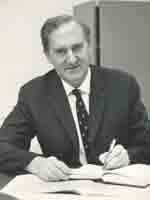
Sir Alan Howard Cottrell was born in July 1919 and is a British metallurgist and physicist.
We understand Alan attended Moseley Secondary School leaving in 1935 to go on to the University of Birmingham where he received his BSc degree in 1939 and a PhD for research on welding in 1942. He joined the staff as a lecturer at Birmingham, being made professor in 1949, and transforming the teaching of the department by emphasizing modern concepts of solid state physics. In 1955 he moved to A.E.R.E. Harwell,to become Deputy Head of Metallurgy under Monty Finniston.
From 1958 to 1965 he was Goldsmiths' Professor of Metallurgy at Cambridge University, and a fellow of Christ College. He then worked for the government in various capacities, ultimately as Chief Scientific Adviser from 1971 to 1974, before becoming Master of Jesus College, Cambridge from 1973 to 1986, and vice-chancellor of the University in 1977-1979.
Sir Alan was elected a Fellow of the Royal Society in 1955, and won its Hughes Medal in 1961, [the James Douglas Gold Medal in 1974 and the Copley Medal (the Royal Society's highest award) in 1996. He was knighted in 1971. He is a member of the Royal Swedish Academy of Sciences.
School: Moseley Secondary School, Birmingham, England (1935)
University: BS, University of Birmingham (1939)
University: Phd Metallurgy, university of Birmingham (1942)
Teacher: Metallurgy, University of Birmingham (1942-49)
Professor: Physical Metallurgy, University of Birmingham (1949-55)
Professor: Mettallurgy, Cambridge University (1958-65)
Administrator: Master of Jesus College, Cambridge University (1973-86)
Administrator: Vice Chancellor, Cambridge University (1977-79)
- Copley Medal 1996
- Rumford Medal 1974
- Knight of the British Empire 1971
- Hughes Medal 1961
- Royal Society 1955
- National Academy of Sciences Foreign Associate
- National Academy of Engineering Foreign Associate
- UK Official Chief Scientific Adviser to the UK Government (1971-74)
- UK Official Deputy Chief Scientific Adviser to the UK Government (1967-71)
- Official Deputy Chief Scientific Advisor to Ministry of Defence (1965-67)
- UK Atomic Energy Research Establishment (1955-58)
Dr. Geoffrey Gibbons
Lawyer, Judge and Organist
 Geoffrey was born in Birmingham in 1927 and educated at Moseley Grammar School and Birmingham University where he was awarded an Honours degree in Law in 1948. He was awarded the degrees of Master of Arts of Warwick University in 1995 and Doctor of Philosophy in History in 1999 and published his doctoral thesis in 2001.
Geoffrey was born in Birmingham in 1927 and educated at Moseley Grammar School and Birmingham University where he was awarded an Honours degree in Law in 1948. He was awarded the degrees of Master of Arts of Warwick University in 1995 and Doctor of Philosophy in History in 1999 and published his doctoral thesis in 2001.
In 1946 he was appointed organist at St. Ambrose Church, Edgbaston an appointment he held until 1960 except for the years 1948 to 1950 when he fulfilled his National service commitment. He was commissioned in the Royal Army Service Corps and completed his service in Egypt. Throughout his time in Egypt he organist at the Church of St. George in Moascar Garrison, Canal Zone. He commanded `C' Section of 479 Supply Platoon and ended his service as acting Captain. During his period of leave he visited Luxor, the Valley of the Kings, and Karnak.
On return to England he completed his Law Society's examinations and in July 1952 was admitted as a solicitor and joined a firm in Birmingham which in the ensuing forty years grew twenty times over with offices in Manchester, London, Exeter as well as Birmingham. When he retired in 1994 he had been senior partner for seven years, had served as a part time District Registrar in the County Court, was a Chairman of National Insurance Tribunals, and between 1977 and 1984 was a Deputy Circuit Judge on the Midland and Oxford Circuit, hearing both civil and criminal cases.
In 1960 he was appointed Organist at the two churches in Henley in Arden and held that post for thirty-four years until 1994 when resigned to have more time for domestic interests. He chaired committees to raise funds to rebuild the large organ in St. John's Church and replace the instrument in St. Nicholas Church with a chamber organ built in 1798. For six years in the 70s he directed the Barnt Green Choral Society. For a number of years after 1994 he played at the monthly services at Packington Church, (the estate chapel of the Earl of Aylesford), on the unique two manual organ built in 1750 to the design of George Frederic Handel. For over 20 years he was a member of the Council and acted as solicitor to the Incorporated Association of Organists.
He has travelled widely in Europe, the Middle East and North Africa, especially in Tunisia, and was appointed Tunisian Consul in the West Midlands in 1990 ano office he still holds.
Geoffrey Gibbons was elected to Solihull Council in 1960 and apart from a short period he remained a member until his retirement in 1997, being elected mayor in 1974 and again in 1984. He founded the Solihull Music Festival in 1988 and was the director of it for ten years. For many years he played cricket for the Old Boys team of his School, tennis with Sparkhill Tennis Club and swims and surfs in Cornwall.
In about 1978 he became a governor of Alderbrook School, Solihull, and has served through the headships of five headteachers, being elected Chairman of the Board of Governors in 1985, resigning in July 2003 on his removal to St. Tudy, Cornwall.
In 1974 he married Hazel and inherited two step-sons, has a daughter Sarah and eight grandchildren one of whom is a boy.
Source: study.org.uk
Sir Douglas Hague
Economist

Sir Douglas Hague
Economist who helped Mrs Thatcher to get to grips with monetarist and free market theory
Sir Douglas Hague, who has died aged 88, was one of Margaret Thatcher's earliest and most loyal economic advisers.
It was as the co-author (with Alfred Stonier) of A Textbook of Economic Theory that Hague, then professor of applied economics at Manchester Business School, was first introduced to the rising star Tory MP for Finchley in 1967. A member of the Conservative Research Department, Michael (now Lord) Spicer, had the task of finding academics to advise the Conservative front bench- and having admired Hague and Stonier's 1953 book in his own undergraduate studies, he arranged for Hague to meet Mrs Thatcher (then junior Opposition spokesman for Treasury affairs) and her mentor Sir Keith Joseph.
A copy of the Textbook was duly presented, and a phrase used by Hague in their first conversation - "sacrifice by instalment" - found its way into her Commons speech against the policies of the Labour chancellor James Callaghan that same day. The relationship flourished; Hague sent regular notes on issues to which he felt she should attend, and helped her to understand the theories of Milton Friedman and others who were challenging the Keynesian consensus. Besides finding Hague's own free-market and pro-enterprise stance sympathetic, Mrs Thatcher particularly admired his ability to explain, on one occasion telling another professor: "You see, Douglas writes more clearly about economics than anyone else in the world!"
During her tenure as Edward Heath's education minister, contact with Hague was less frequent - but she insisted that they lunch occasionally (at the Epicure restaurant in Soho) because "the Department is full of communists and I need to check on issues ... with someone whose views are like mine."
When she became party leader in 1975, Hague's time was largely divided between his Manchester post and the Prices Commission in London, but he also served as one of her speechwriters; and during her 1979 campaign he was one of the very few academic economists who publicly supported her. After the election was won, an early paper in her Downing Street in-tray was from Hague urging the abolition of exchange controls - which was done within the year.
Hague was a consultant to the No 10 Policy Unit from 1979 to 1983, advising on employment and other issues at a time when a gallery of economic thinkers were competing for the prime minister's ear. During the painful 1981 recession he argued (and Mrs Thatcher, guided by another of her gurus, Alan Walters, eventually agreed) that interest rates were too high, and the private sector suffering too much, as a result of excessive focus on control of the money supply.
Towards the end of his Downing Street stint, Hague moved his academic base from Manchester to Templeton College, Oxford - conveniently closer to London - and responded to a Policy Unit call for more sophisticated British management education by creating the Oxford Strategic Leadership Programme, which became internationally recognised as a stepping-stone for high-fliers. The prime minister, however, was initially sceptical: "Leadership?" she said to Hague. "You tell people what to do and they do it. That's leadership!"
Douglas Chalmers Hague was born in Leeds on October 20 1926. He was educated at Moseley Grammar School and King Edward VI High School in Birmingham before reading Economics at Birmingham University and joining the faculty of commerce there in 1946.
The following year he moved to University College, London, where became a reader in political economy. In 1957 he was appointed to a professorship at Sheffield, where he was head of business studies, and in 1963 he moved to Manchester.
He was a member (and latterly deputy chairman) of the Prices Commission from 1973 to 1978. Though he was instinctively hostile to its core purpose of detailed price regulation across a range of sectors - and later described joining the commission as "the worst decision I ever made" - he admitted to finding its workings fascinating.
From 1983 to 1987 he was chairman of the Economic & Social Research Council, and thereafter he was a non-executive
director of a variety of business ventures. He continued to write speeches for the prime minister from time to time, and (as a member of Oxford's Wesley Memorial Church, which she herself had attended as an undergraduate) he was particularly proud to have provided her in 1988 with words from John Wesley to support a call to the wealthy, who had recently enjoyed tax cuts, to turn to philanthropy: "Get all you can. Save all you can. Give all you can."
Besides his affection for Margaret Thatcher, Hague described her husband Denis as "wonderful... he really did bring an unerring judgment on political and personal issues". He remained in touch with both in later years.
Hague was a prolific author and co-author, turning his attention in the last phase of his academic career to the relationship between science and business innovation in works such as Spin-offs and Start-ups in UK Universities (with Kate Oakley, 2000); Oxford Entrepreneurs (with Christine Holmes, 2006); and From Bright Sparks to Brilliant Businesses (with Anthea Milnes, 2010).
He was appointed CBE in 1978 and, in 1982, became the first of Mrs Thatcher's economic advisers to be knighted.
Douglas Hague listed his recreations as "church organs and watching Manchester United". He married first, in 1947, Brenda Fereday, with whom he had two daughters. The marriage was dissolved, and he married secondly, in 1986, Janet Leach.
Sir Douglas Hague, born October 20 1926, died February 1 2015
Source: Sir Douglas Hague, economist - obituary - Telegraph
Derek Hathaway OBE
Businessman
A Moseley-Made Millionaire. Born 1944; Derek attended Moseley School from 1955 until 1960.
He remembers his Moseley years as a time of tremendously talented teaching staff and schoolmates. The school excelled both academically and on the sports field. "There was a sense of team, of working together." He recalls also a strong sense of discipline. He still has all of his Moseley School reports! On balance they show a conscientious and enthusiastic worker having, he says, average abilities. It was perhaps his personal work ethic that enabled him to be so successful in later years. He was too, a keen sportsman. He played in the house and school rugby and cricket teams and was captain of the 3rd XV rugby team, 1959-60. - and was also a school chorister for all five Moseley years. Lifelong friendships were formed in those years particularly with "His Eminence" Barry Priory, now Rector of Porlock, Somerset, and with John Sheppard, then teaching English at Moseley, and involved with sports coaching as well. At age 16, he was forced to leave school to support his family ("but it was probably for the best, given my family circumstances and academic record.") and he went to work for the Harris Engineering Company as a Heating, Ventilation and Air Conditioning draftsman. Then - in 1966 (at age 22), he and a financial partner took the plunge and started their own business manufacturing industrial air heating units. Six years later, his growing company was floated on the London and Midlands stock exchanges, at which time he became the youngest Chairman of a public corporation in Great Britain. In 1979, his company merged with the U.S.-based Harsco Corporation, where he was until recently Chairman, President and Chief Executive Officer. Under his leadership, Harsco grew to become a $2 billion worldwide industrial services and engineered products company having operations in 43 countries and 17,500 employees.
While his principal home is in the States he keeps many links with Britain including service as a Magistrate in the Victoria Law Courts and as Vice Chairman of the Blue Coat School in Birmingham, together with a number of charitable and business Boards. And he's a trustee of the American Air Museum in Oxford, Cambridge.
Back in the States, Derek Hathaway has been honoured with the Doctor of Laws and Doctor of Humane Letters degrees from two U.S. universities. In 1998, he received the prestigious Ellis Island Medal of Honour from the National Ethnic Coalition of Organizations, joining the ranks of former United States Presidents in receiving this award. In 2008 Derek was awarded an OBE (Order of British Empire) by Her Majesty Queen Elizabeth II in recognition of his "Services to Industry and Charity" in his native United Kingdom and overseas.
Derek was an avid supporter of Moseley School and The Moseleians Association and returned on several occasions to attend reunions and other events.
Maurice Herriot
Sportsman, Tokyo Olympic Steeplechase Silver Medallist
 Born 1939 in Great Wyrley, Staffordshire, We understand Maurice Herriott attended College Road Senior School and later Moseley Modern School when the school mover 'up the hill'. For almost a decade the British team selectors never pondered when they came to choose their top steeplechaser - the name of Maurice Herriott was invariably the one written down on the team sheet. From 1959 to 1967 he claimed the AAA's title eight times (every year except 1960). He won countless international match events and on the big occasions was a consistent performer. His greatest moment came in 1964 at the Tokyo Olympic Games when, aged twenty-four, he won the silver medal in a UK record of 8min. 32.4sec. behind Gaston Roelants of Belgium. The previous year he had set the UK record of 8min.40.4sec. His first major international medal came in 1962 at the Commonwealth and Empire Games when he took the silver medal in a time of 8min. 45sec. behind Trevor Vincent of Australia (8min. 43.4 sec.). In the 1962 European championships he had to scratch from the final, but it was the mid-sixties that saw him at his peak. In 1965 Herriott was again voted British Male Athlete of the Year (he had also won in 1963) and during that summer he won his event in the matches against Poland, Hungary, West Germany, the European Cup semi-final in Zagreb (8min. 36.2sec.) and ran eight races faster than the UK's number two ranked steeplechaser, his "sparring partner" Ernest Pomfret. In 1977 his 1964 UK record was still one of the top ten UK best performances of all-time, in the era of modern synthetic running tracks (Maurice ran on 'cinders'). He never quite repeated his two silver medal-winning runs of 1962 and 1964 (his only Olympics) but still finished fourth in the 1966 Commonwealth Games. The photo above shows him competing at the White City, London, in the British Games which he won in 8min.44.2sec. (George Herringshaw)
Born 1939 in Great Wyrley, Staffordshire, We understand Maurice Herriott attended College Road Senior School and later Moseley Modern School when the school mover 'up the hill'. For almost a decade the British team selectors never pondered when they came to choose their top steeplechaser - the name of Maurice Herriott was invariably the one written down on the team sheet. From 1959 to 1967 he claimed the AAA's title eight times (every year except 1960). He won countless international match events and on the big occasions was a consistent performer. His greatest moment came in 1964 at the Tokyo Olympic Games when, aged twenty-four, he won the silver medal in a UK record of 8min. 32.4sec. behind Gaston Roelants of Belgium. The previous year he had set the UK record of 8min.40.4sec. His first major international medal came in 1962 at the Commonwealth and Empire Games when he took the silver medal in a time of 8min. 45sec. behind Trevor Vincent of Australia (8min. 43.4 sec.). In the 1962 European championships he had to scratch from the final, but it was the mid-sixties that saw him at his peak. In 1965 Herriott was again voted British Male Athlete of the Year (he had also won in 1963) and during that summer he won his event in the matches against Poland, Hungary, West Germany, the European Cup semi-final in Zagreb (8min. 36.2sec.) and ran eight races faster than the UK's number two ranked steeplechaser, his "sparring partner" Ernest Pomfret. In 1977 his 1964 UK record was still one of the top ten UK best performances of all-time, in the era of modern synthetic running tracks (Maurice ran on 'cinders'). He never quite repeated his two silver medal-winning runs of 1962 and 1964 (his only Olympics) but still finished fourth in the 1966 Commonwealth Games. The photo above shows him competing at the White City, London, in the British Games which he won in 8min.44.2sec. (George Herringshaw)
Source: sportingheros.net
Frank Ifield
Singer
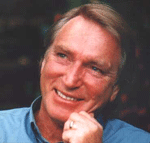 Frank Ifield, who attended College Road Senior School, began recording at age 13 and in six years had 44 records issued in Australia. Frank became the Number One Recording star in Australia, New Zealand, and Tasmania before he was nineteen. Signed by EMI Records on Columbia shortly after he came to London, Frank zoomed to the top of their most popular recording artists with I Remember You, followed soon afterwards by Lovesick Blues, The Wayward Wind, Nobody's Darling But Mine, Confessin', and Waltzing Matilda. So popular was h
Frank Ifield, who attended College Road Senior School, began recording at age 13 and in six years had 44 records issued in Australia. Frank became the Number One Recording star in Australia, New Zealand, and Tasmania before he was nineteen. Signed by EMI Records on Columbia shortly after he came to London, Frank zoomed to the top of their most popular recording artists with I Remember You, followed soon afterwards by Lovesick Blues, The Wayward Wind, Nobody's Darling But Mine, Confessin', and Waltzing Matilda. So popular was h
is recording of the beloved Australian ditty Waltzing Matilda it is now almost regarded as his signature tune.
FRANK IFIELD became the first artist to ever have three consecutive number one hits in Britain and also, to be awarded three gold discs in the space of a year! From being unknown in 1959, Frank soared to the dizzy heights of stardom in 1962, remaining there ever since.
Source: Shownet.com

2008: Barry Phillips caught up with Frank Ifield on a trip to Australia where Frank now lives.
Anthony Jackson
Actor
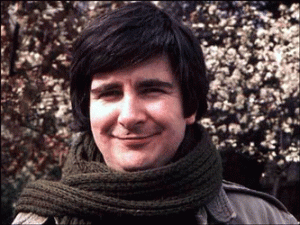 Anthony Thomas Jackson, actor: born Birmingham 18 February 1944; married (one son, two daughters, and one daughter deceased); died London 26 November 2006.
Anthony Thomas Jackson, actor: born Birmingham 18 February 1944; married (one son, two daughters, and one daughter deceased); died London 26 November 2006.
A successful acting career - spanning over 40 years was not what Anthony planned when he left Moseley School in 1960 after completing 5 years, at the age of 15. Inspired by his art teacher, Lou Emery he took work as a set builder and painter at the B 'ham Repertory Theatre, for three years, and enrolled at the Birmingham School of Art. As befits an Irishman he then changed course completely to take acting work and his first part was with George Baker and Juliet Mills, in 1962, in "The Glad and Sorry Season." Three years at the Rose Bruford Drama College followed culminating in winning the BBC Radio Drama Award and a post with the BBC Repertory Company with whom he has had a close and successful relationship. In 1968 he left to join the Mermaid Theatre in many productions including the famous "Lock up your daughters" and "Treasure Island."
Anthony's vocal versatility has led to much work in animation. He was heard as most of the characters in Oliver Postgate's "Ivor the Engine"; and in "Dreamstoie," "Watership Down" and "Shakespeare the Animated Tales." Narrating plays for radio and TV and Talking Books and dubbing films at home and abroad has kept him in continuous employment and, very satisfyingly he has prizes for verse speaking, and has recited on stage and radio, and for TV and Open University. Back on stage again at the Young Vic; and the lead in "The Faith Healer" by Irish dramatist Brian Friel, among many other roles.
His TV appearances read like a Who's Who of that medium including Doctors, Casualty, The
Detectives, The Bill, Lovejoy series, Boon, Eastenders, Only Fools and Horses, Citizen Smith, Rentaghost series, Bless this House series (as 'Trevor' Sid James' loveable next-door neighbour) and many, many more. Trull a man of many parts.
Apart from his appreciation of the part that Lou Emery played in his career, Anthony describes W.R."BiIl" Rees as a particularly effective Moseley teacher and mentor who became a life-long friend.
Dr John Lumby
Industrialist and Inventor
 After leaving Moseley John Lumby embarked on an illustrious career in industry and academia although his interests extended from science to history and rugby to motor sport. He was 79 and had been a member of the Moseleians Association since its early days.
After leaving Moseley John Lumby embarked on an illustrious career in industry and academia although his interests extended from science to history and rugby to motor sport. He was 79 and had been a member of the Moseleians Association since its early days.
During his climb to prominence he took a degree at the College of Advanced Technology later Aston University and subsequently at Birmingham University gained his M.Sc. followed by his doctorate.
From his initial work and study when at ICI Metals Division, he moved to the Lucas Group Research Centre in 1965 where he concentrated on the development of advanced industrial ceramics. In this field his work on the invention of the material sialon became internationally recognised, though John was always self-effacing about achievements which led to his securing 20 patents worldwide and lecture tours to Europe, the USA and Japan.
Speaking of her husband's career his wife, Erica said: “John always spoke in glowing terms of the staff at Moseley, particularly his science teachers, who gave him the grounding for his lifetime's work.”
Among recognition he received was in 1984 the Prince of Wales Award for Industrial Innovation and Production, shared with Prof. Ken Jack of Newcastle University.
He left Lucas five years later and spent a decade as visiting research fellow in Warwick University physics department, again much involved in the development and industrial application of sialon, which resists temperatures up to 1250 deg C.
Father of a son and daughter, John whose first name was Roland became historian and membership secretary to Worcester Rugby Club and, living in Fernhill Heath, formed an affinity with the nearby Droitwich History and Archaeological Society. He was also a keen supporter of the Shelsley Walsh Hill Climb. John passed away on 26th June 2015
Anton Lesser
Actor
"My memories of Moseley are all fond ones"
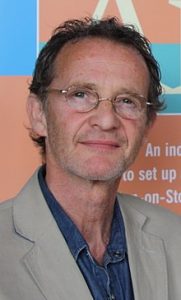 From Moseley I went to Liverpool University to study architecture, and having graduated I then went to Nigeria to complete the requisite 2 years in practice. But while there I realised my true passion was for the theatre and nine months into my qualifying years, I returned home and applied to R. A.D. A.
From Moseley I went to Liverpool University to study architecture, and having graduated I then went to Nigeria to complete the requisite 2 years in practice. But while there I realised my true passion was for the theatre and nine months into my qualifying years, I returned home and applied to R. A.D. A.
My first professional job was playing Richard of Gloucester in the "Henry Vlth" cycle at Stratford. This was the beginning of a long association with the R.S.C. for whom I played, among other parts, Romeo, Troilus, Petruchio, and Richard the Third. In the early 80's it was Hamlet at the Donmar Theatre and the Piccadilly Theatre my first attempt at this role since a Moseley School production when I was 13!
Since then I have worked mainly in television and film with the occasional return to the stage, most notably the National (The Birthday Party; Wild Oats; Private Lives) and last year at Hampstead Theatre in a lovely play called "The Lucky Ones." Of the more recent TV work, the Peter Ackroyd documentary about Charles Dickens stands out as a favourite, and I assumed that disguise again recently reading A Christmas Carol".
When Anton studied at Liverpool he went there with another Moseleian Doug. Eburah, who lives and works as an architect in Stratford now.
More recently Anton has been in Pirates of the Caribbean, Ripper Street, Game of Thrones and Wolf Hall.
Mickey Lewis
Sportsman, Footballer
 Mickey Lewis, FootballerMichael "Mickey" Lewis, was born in 1965 and attended Moseley School. He played professional football for west Bromwich Albion, Derby County and Oxford United where he is currently the assistant manager.
Mickey Lewis, FootballerMichael "Mickey" Lewis, was born in 1965 and attended Moseley School. He played professional football for west Bromwich Albion, Derby County and Oxford United where he is currently the assistant manager.
Michael was a professional footballer and manager who played for West Bromwich Albion, Derby County and Oxford United. From October 1999 to February 2000 and then again from January to March 2014 he was the caretaker manager at League Two side Oxford United.
He left Oxford in the middle of 2015 after a 27-year association with the club, and 8 years as a member of the coaching staff and was appointed head coach/manager at Hayes & Yeading United in May 2016. He stepped down as first-team manager in October 2016.
In his younger days Mickey was often mistaken for Kevin Keegan, not for his silky skills but for his permed hair. His biggest claim to fame was once beating Maythew Rigby in a sprint.
At school Mickey was in the U13s and later U14s. A team that was unstoppable and sometimes had to stop the march early because they were into double figures. Mickey was the rock in their defence.
Sadly, Mickey passed away on 5th March 2021 after being diagnosed only two weeks earlier with a rare form of lung cancer. He was a lovely lad when at Moseley and by all accounts a very popular figure in football in later life.
Source: Wikipedia
Joanne Malin
Radio and TV Presenter
 Young Joanne Malin (1978-1983) came to Moseley School just two years after the present campus had been formed by merging the two schools, and she took full advantage of the additional opportunities that were opened up to girls. She played in every sports team (except hockey which she hated!) and shone in the classroom too, achieving 8 "O" levels and says she "enjoyed every week of every year" apart from Science classes. She thanks the French teacher, Mrs. Cooper for encouraging her to go on a schools exchange programme and made new life-long friends with her French "swop" family and came back understanding French! The low spot was missing out on a school ski-ing trip because it was too expensive and having all her books stolen from her mum's car in her GCSE year . "My inspirations at school were the two PE teachers, Mrs. Richardson and Mrs. Taylor for all the extra-curricular activities they provided and all the time they gave to the sports teams in the evenings and at week-ends." Another favourite was Mr. Hop wood (History) and she still remembers him suffering a cut ear when a football flew thought he staff dining room window!
Young Joanne Malin (1978-1983) came to Moseley School just two years after the present campus had been formed by merging the two schools, and she took full advantage of the additional opportunities that were opened up to girls. She played in every sports team (except hockey which she hated!) and shone in the classroom too, achieving 8 "O" levels and says she "enjoyed every week of every year" apart from Science classes. She thanks the French teacher, Mrs. Cooper for encouraging her to go on a schools exchange programme and made new life-long friends with her French "swop" family and came back understanding French! The low spot was missing out on a school ski-ing trip because it was too expensive and having all her books stolen from her mum's car in her GCSE year . "My inspirations at school were the two PE teachers, Mrs. Richardson and Mrs. Taylor for all the extra-curricular activities they provided and all the time they gave to the sports teams in the evenings and at week-ends." Another favourite was Mr. Hop wood (History) and she still remembers him suffering a cut ear when a football flew thought he staff dining room window!
After Moseley Jo went on to South Birmingham College to take a BTEC in Business and Finance but the lure of the stage took her instead to the Italia Conti Theatre School in London for the next 3 years, and after graduating in Performing Arts gained her first acting role in Pantomime at the B'ham Hippodrome! Then on tour with the West End show "42nd Street", Frenchy in "Grease, " and entertaining tourists on the Cunard Cruise Line.
But new challenges called her ("And a job I hoped would let me keep working after I was 30") to become a Broadcast Journalist via a post-grad, course at Highbury College, Portsmouth. Her breakthrough came with work on local radio before joining Reuters in London, and Virgin national radio as the News, weather and Sport presenter on the Sony Award- winning programme,"The Russ and Jono Breakfast Show." She appeared live on TV in "LIVE TV" and that propelled her back to the Midlands in 1998 to join the prestigious Central News presenting team with the morning, lunchtime and afternoon bulletins, and as co-presenter of'' Central News at 6". Additionally her now familiar face and voice appear on Sky News at weekends (and on Capital Radio). So young Joanne Malin has made two successful career moves already and no doubt will be chalking up more fame and fortune in the near future. Watch This Space!
"My advice to Moseley pupils today," she says "would be Keep your options open and make your own luck!"
On 10 October 2008, she announced her decision to leave ITV Central, shortly after the announcement of 60 job losses at the station and a major restructuring of Central News. Malin presented her final programme for the station on 31 October 2008. A week beforehand, Malin announced live during an interview on BBC WM that she would be joining the BBC on a two-year contract. She has presented a mid-morning show on BBC WM since February 2009, with a view to contributing to Midlands Today and the West Midlands edition of Inside Out.
Awards
In October 2006 she won the Royal Television Society Midlands Centre's Best On Screen Personality award, for her work on Central Tonight. She had previously won the award in October 2003 and has also won the Harold Wincott National Business Broadcasting Award for a series of business reports on Central News at Six. Three days prior to leaving ITV Central, she won the RTS Midlands' Best Female Personality award for 2008.
Rev John Masding
Chairman of the English Clergy Association
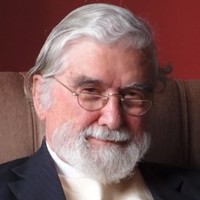 John Masding was the Chairman of the English Clergy Association and has recently retired as Vicar of Hamstead in the diocese of Birmingham.
John Masding was the Chairman of the English Clergy Association and has recently retired as Vicar of Hamstead in the diocese of Birmingham.
THE Revd John Masding, died in 2017 aged 77, after a long illness, was tall and distinguished in appearance, with a kind and genial manner, matched by a distinctive white beard imparting a patriarchal touch.
John cut a figure never to be forgotten by all who met him. His rich and melodious bass tones will be recalled with love and affection in the parishes he served, and in the many bodies in which he played a part in the national Church.
After Moseley Grammar School, John went up to Oxford, to read history at Magdalen College, where he was elected a demy. Ordination training followed at Ridley Hall, Cambridge, and then, in 1965, a curacy in Sutton Coldield.
In 1971, John became Vicar of St Paul’s Hamstead, in Birmingham, a parish of 17,000, from which he retired in 1997. He was convinced of the strength imparted by a long and continuous ministry in one place, and, today, generations of Hamstead people give thanks for the legacy he left, both in their church and in their lives.
Long before the phrase “all-age worship” came into being, John had created a memorable example of it at Hamstead, where visitors invariably came away with a vivid memory of a happy family church, bubbling with life and warmth. John’s public worship was always user-friendly and delivered with great liturgical skill; as a pastor, he was gentle and understanding; he was a constant encourager of others.
A preacher of verve and passion, he could tuck his cassock into his trousers, and ride a bicycle round the church, using it as a visual aid to deliver words that touched all ages, while being equally at home delivering a penetrating pulpit address.
These rhetorical skills were much in evidence in his contributions to synods, committees, and conferences. After retiring from Hamstead, John’s ministry was much valued in the dioceses of Bath & Wells and Bristol, particularly at Christ Church, Bristol City, where he became a trustee.
John’s sense of history gave him great unease about many recent developments in the Church of England. He was concerned about the loss of the freehold, the gradual erosion of private patronage, modern liturgy, and ever-growing bureaucracy. These things led him to become a council member of the Ecclesiastical Law Society, and, with others, he was instrumental in re-establishing the LLM in Canon Law at Cardiff University, a degree he took himself.
He gave much time to advising other clergy who felt that their legal rights were under threat. John was a prominent member of the Prayer Book Society, but his greatest achievement was the founding of the English Clergy Association. He chaired it for many years, directing its vision of upholding “the traditional understanding of the Church’s life and witness”; and many needy clergy have been helped by the Association’s holiday grants. John served for some years on the Court of the Corporation of the Sons of the Clergy.
John lived a rich and varied life. His vintage Bentley was often seen in the streets of Birmingham, and he kept a well-stocked cellar, and had a wide circle of friends. In retirement, he was an active member of the Bath and County Club, and its chairman for some years.
Above all, he was a family man. His first wife, Veronica, died in 1989, the mother of Aelfwynn and Miranda, his two married daughters. In 1992, John married Margaret, and she and his daughters survive him. At the time of his death, he had four grandchildren, and five step-grandchildren. He loved and cherished them all.
Source: www.churchtimes.co.uk
Dr Roy Massey MBE
Organist
Dr Roy Massey. Photograph courtesy of Hereford Cathedral http://www.herefordcathedral.org/music/latest-news
"If I have any advice for a youngster it is be ambitious and don't be afraid of being different from those around you. Go for it, if you really want to achieve an ambition. Be single minded; work hard; and do not be ashamed of wanting to do something out of the ordinary. Your life is not a dress rehearsal it is here and now. You only have it once. It is up to YOU."
This is the philosophy that gave Roy Massey such success in life, as he progressed to being an internationally acclaimed organist, conductor and musical director, and finally national President of the Royal College of Organists He writes: Ever since I was eleven years old I knew that I wanted to be a Cathedral Organist. I had started to learn the piano at the age of 7, and at the same time joined the choir of St. Martin's (in the Bull Ring) where the great Dr. Richard Wassell was organist. When I first heard him play I was smitten for life. By the time I went to Moseley School in Sept. 19451 was playing for services at a local church and spending every spare minute practising. I loathed sporting activity of any kind, lived in mortal fear of the gym master(Mr. Gillespie) and the Head, and found maths and anything scientific totally beyond my comprehension but I did have my music.
In my third year (1948) at Moseley, Stanley Adams arrived and transformed my school life as he rapidly created a choir and orchestra, encouraged boys to be musicians, and even managed to persuade hardened rugby playing types to sing. We did orchestral concerts, operas, chamber music, and took part in the Schools Music Festival which he conducted in the Town Hall. I think I was the first Moseley pupil ever to do music as a subject for the newly introduced "O" and "A" levels; and while in the 6th Form passed the Associate of the Royal College of Organists diploma and duly passed on to B'ham University to read for a B .Music degree, plus a Dip.Ed. Despite my qualifications it was not easy for a working class boy to break into this exclusive world, but I made a reputation working with the choirs in two B'ham churches, started broadcasting with the BBC, and was teaching in two schools and for the Royal School of Church Music. The post of Warden of this prestigious residential College came out of the blue, and led to me playing at the Royal Albert Hall, Westminster Abbey and other high profile locations Three years later back to Birmingham as Organist of St. Philip's Cathedral and Director of Music at King Edward's School. I'd arrived I was a Cathedral organist!
After 6 very happy years in Birmingham I moved to Hereford Cathedral where I worked with world class orchestras and international soloists as Conductor of the Three Choirs Festival AND played as an organ recitalist throughout the world. My Hereford career was splendidly varied and I enjoyed every minute of my 27 years there.
I have also been rewarded with special honours A Doctorate of Music for services to Cathedral music, in 1990; an M.B.E. from the Queen for services to organ playing, in 1997 and recent election as President of the Royal College of Organists the very top of the organists' profession.
Peter McGowran MVO
Chief Yeoman Warder HM Tower of London (Retired)

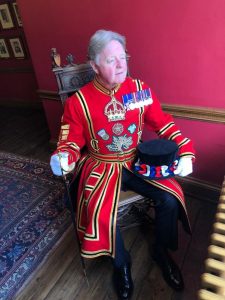 Former Chief Yeoman Warder of the Tower of London and former Moseley Modern School pupil Peter McGowran MVO was born the eldest of eight children living in Highgate, Birmingham in 1958. He started school at Chandos School before the family moved to Phipson Road, Sparkhill when he continued his junior years at St John’s CofE Stratford Road before eventually joining Moseley Modern School in 1969. Peter takes up the story:
Former Chief Yeoman Warder of the Tower of London and former Moseley Modern School pupil Peter McGowran MVO was born the eldest of eight children living in Highgate, Birmingham in 1958. He started school at Chandos School before the family moved to Phipson Road, Sparkhill when he continued his junior years at St John’s CofE Stratford Road before eventually joining Moseley Modern School in 1969. Peter takes up the story:
I would not change a thing: I enjoyed my school days all the sport especially playing cricket and football for the school and taking part in the school performances that were laid on year after year, it was a blast. I believe that it is possibly due to the thespian in me that eventually got me into the Tower of London as a Yeoman Warder (Beefeater) in actual fact the 388th Yeoman since 1826 when the then Constable of the Tower, The Duke of Wellington re wrote the qualification to be a YW.
Enlisting in the Royal Air Force Regiment in March 1975, I progressed through the ranks to become a flight sergeant, operating in many roles around the world; Hong Kong/Chinese border operations, Northern Ireland, Belize, many years in West Germany during the cold war, Cyprus and Gibraltar. I spent over 25 years in the RAF. I married Debby in 1977, who was also in the RAF and we have 3 children who have all been married in the Tower, and now have 7 grandchildren, they have followed and supported me around the world and I feel so blessed to have had such a team around me.
I joined the Body of Yeoman Warders at the Tower of London in August 2009, following a period working in the nuclear industry and overseas for a while. The Body consists of a total of 35 Yeoman Warders who all must come from a military background, having completed a minimum of 22 years in the armed forces, achieved the minimum rank of sergeant major and have been awarded the Long Service and Good Conduct Medal.
As a serving member of the Yeoman Body, my correct title was 'Chief Yeoman Warder of His Majesty's Palace and Fortress the Tower of London, Member of the Yeoman of the Guard ‘In Extraordinary'. The CYW's daily role within the Tower was to manage the Body of Yeoman Warders which included giving guided tours to VIP's including members of the Royal Family and contributing to the safety and security of the iconic world heritage site. In addition, I may of also be called upon to attend the lying-in state and coronation of a sovereign. My favourite task involved the nightly closing down ceremony of the tower known as the Ceremony of the Keys, which dates back over 700 years.
Since being in the tower I was involved in some of the most historic events; in 2012 I was sent to the USA to tour various states giving talks about the monarchy and explain the event that was going to take place in the UK that year due to HM celebrating her Diamond Jubilee. The same year we enjoyed the London Olympics and keeping all the medals under lock and key at the tower was a very serious chapter in my life! 2014 was the year that we planted 888,246 ceramic poppies in the moat, a world class event to commemorate the start of WW1. On the 16th of October that year as the Chapel Clerk for the two chapels of HM within the tower, I had the honour to personally escort the late HM QEII to re-dedicate the Chapel Royal of St Peter ad Vincula, we had a service for HM in which I was very honoured to also escort herself and the Duke of Edinburgh to the service. In 2018 we put another world class event in the moat of the tower by lighting 10,000 fuel lamps to commemorate the end of WW1, over 50,000 visitors per evening came over a three-week period to observe the spectacle. Since being at the tower I have also spent many years looking after the historic Raven Birds therefore, being part of the 4-man Ravenmaster team, basically looking after 6-8 ravens 24/7, this was a very rewarding job.
As the Chief Yeoman Warder my last few years in the Tower were part of the most historical years in the 1000 years of the Tower! Taking care of the Tower during the Pandemic, helping organise the Platinum Jubilee of the late QEII, helping organise and personally taking part in the lying-in state and the funeral of the late QEII and being very much involved with the Coronation of HM King Charles and Queen Camilla. Even after recently retiring, 1 August 2023, I still pinch myself realising that I was the 41st Chief Yeoman Warder since the mid 1500’s.
I feel so humbled to of been part of living history for my 14 years living in the Tower and hopefully demonstrated that it doesn’t matter what your background, if you have dreams and goals to achieve and make a difference in life then there are no barriers to what you can do. I owe a lot to my family and the Birmingham Crew who have all helped and enabled me to have the exciting and fulfilling life I have led. I now live in Suffolk, but all my brothers and sisters are still in Birmingham, and I never turn down any excuse to return to Brum especially if a party is going on! It was an honour to attend the Schools Centenary this year and chat to so past and present pupils and teaching staff, and it only seemed the right thing to do was to have a photo in uniform in yet another Tower! Obviously, the Tower in our school did not see as many executions as the Tower I have just escaped from!!!
The final series of “Inside the Tower” Channel 5 Is due to start October 2023, I hope you learn and enjoy the antics of the behind curtain scenes within the Palace of His Majesty King Charles III.
Barry Pritchard
Musician, The Fortunes
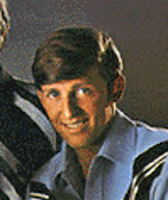 Barry Pritchard IN 1963, in Birmingham, the guitarist and vocalist Barry Pritchard formed a group called the Fortunes with Glen Dale and Rod Allen, and they were signed by the eccentric promoter Reg Calvert. Pritchard recalled the first bookings: "Reg held competitions and, if people shouted a number that we couldn't do, he would pay them half-a- crown. It was no big deal. There might be 20 people shouting out, so Reg would pick out numbers that we knew."
Barry Pritchard IN 1963, in Birmingham, the guitarist and vocalist Barry Pritchard formed a group called the Fortunes with Glen Dale and Rod Allen, and they were signed by the eccentric promoter Reg Calvert. Pritchard recalled the first bookings: "Reg held competitions and, if people shouted a number that we couldn't do, he would pay them half-a- crown. It was no big deal. There might be 20 people shouting out, so Reg would pick out numbers that we knew."
The Fortunes, as a five-piece with David Carr and Andy Brown, were signed to Decca, and their first single, "I Love Her Still" (1963), was written by Pritchard. Their second, the songwriter Tony Hiller's infuriatingly catchy "Caroline" (1964), became the theme music for the pirate radio station Radio Caroline, and was a European hit. The Fortunes stood out from other 1960s beat groups because of their distinctive four-part harmonies. "Barry Pritchard had the high voice," says Tony Hiller, "and he was sensational. His high notes really made `Caroline' work for me."
The Fortunes recorded two numbers for a live album from the Cavern club in Liverpool (1964), but their subsequent singles failed to sell. The record producer Noel Walker remembers: The Fortunes' contract came up for renewal and Decca didn't want to renew it. I had recorded them at the Cavern and I told Decca that they sung wonderfully and deserved another chance. I wanted to use them as singers backed by professional musicians and I found a beautiful song, "You've Got Your Troubles". The record turned out exactly how I wanted and I regard Barry's harmonies as fundamental to the Fortunes' sound. "You've Got Your Troubles" (1965) climbed to No 2 in Britain and No 7 in the United States, but the Fortunes bravely admitted that they had not played their own instruments on the record. As with the Monkees and Love Affair, the public became suspicious of their abilities. However, they played well in concert, where their hit song was stripped of its middle-of-the-road arrangement. And, as the songwriter Roger Greenaway says, "There are 160 versions of `You've Got Your Troubles', but the Fortunes' is very much the best." Their follow-up single, "Here It Comes Again" (1965), despite its similarities to "You've Got Your Troubles", was an international hit, and "This Golden Ring" (1966) was also successful. Then the hits stopped. Noel Walker recalls: "Barry was the most outgoing of the Fortunes and was a calming influence when things went wrong. He took the ups and downs much better than the rest." The Fortunes released some fine singles - "The Idol" (1967), "Seasons in the Sun" (1968) and "Loving Cup" (1968) - but they didn't sell. "We were like wet fish on a slab," said Pritchard, "and it took us some years to get back." The comeback finally came with a cover version of Pickettywitch's "That Same Old Feeling" for the American market. It was followed by "Here Comes That Rainy Day Feeling Again", which made the US Top Twenty in 1971. Then came two Top Ten hits in Britain - the reggae- influenced "Freedom Come Freedom Go" (1971) and "Storm in a Teacup" (1972, written by Lynsey De Paul). In 1984 the Fortunes were part of the successful double album Hooked On Number Ones, but by then they were resigned to cabaret dates and oldies shows. Pritchard, who was not a large man, had to endure Rod Allen calling him "a small Fortune" on stage every night. In 1995, suffering from heart trouble, Pritchard was forced to leave the group. He and his family opened a bar and restaurant on the Costa del Sol. The Fortunes are about to embark on a nationwide tour with Gerry and the Pacemakers, but Rod Allen is the only remaining original member. Barry Pritchard, singer and guitarist: born Birmingham 3 April 1944; twice married (four sons); died Swindon, Wiltshire 11 January 1999.
Source: The Independent
Steve Rouse
Head Groundsman, Warwickshire County Cricket Club
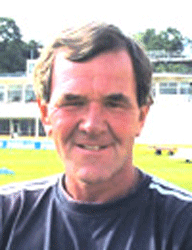 I started my working life at Edgbaston at the age of 17 after leaving Moseley College. I stayed on the playing staff with Warwick shire County Cricket Club for the next 15 years. Unfortunately I was forced to retire from the game in 1983 due to chronic knee problems and after several knee operations. Having enjoyed so many years in cricket I decided to get involved with the grounds side and set up my own business, with a staff of three, working as a sports ground maintenance contractor.
I started my working life at Edgbaston at the age of 17 after leaving Moseley College. I stayed on the playing staff with Warwick shire County Cricket Club for the next 15 years. Unfortunately I was forced to retire from the game in 1983 due to chronic knee problems and after several knee operations. Having enjoyed so many years in cricket I decided to get involved with the grounds side and set up my own business, with a staff of three, working as a sports ground maintenance contractor.
In 1993 I was invited by my old club to become their Head groundsman, a position I found more than appealing. Since I took over I have made significant changes to the ground in an attempt to improve an ageing square and outfield.
Source: PC Pitchcare.com
Gladstone Small
Sportsman, Cricket
 Gladstone Small England (Test: 1986-1990/91); England (ODI: 1986/87-1992); Warwickshire (Main FC: 1980-1997); South Australia (Main FC: 1985/86); Marylebone Cricket Club (Main FC: 1988); Warwickshire (Main ListA: 1980-1999); South Australia (Main ListA: 1985/86);
Gladstone Small England (Test: 1986-1990/91); England (ODI: 1986/87-1992); Warwickshire (Main FC: 1980-1997); South Australia (Main FC: 1985/86); Marylebone Cricket Club (Main FC: 1988); Warwickshire (Main ListA: 1980-1999); South Australia (Main ListA: 1985/86);
One of the most improbable-looking of all Test cricketers, Gladstone Small had his moment of glory to help England retain the Ashes in 1986-87. Small, a last-minute replacement, stunned a Boxing Day crowd of 58,000 at the MCG by splitting Australia's first innings wickets with Ian Botham. Small took 5 for 48 and Australia were rolled over for 141. When England won, Small was named Man of the Match, as much for his enthusiasm as anything: he was always a whole-hearted tryer, a committed team man and a delightful guy. Australia's discomfiture was increased by Small's strange build: seemingly without a neck, he walked around as though he still had a coathanger inside his jacket. He came to England from Barbados just after his 14th birthday the cut-off date for automatic qualification. However, the combination of his looks and his then-pair of nerdish specs made the Lord's registration committee think he had no chance of ever playing Test cricket anyway, so they let him through. In good times, Small might not have played for England; he was neither especially fast nor reliable, and early in his career was an infuriatingly regular no-baller. But he cut his run right down and settled for being predominately an outswing bowler, still hostile enough to worry even the best batsmen, as Australia found again a week after the MCG, when he whipped through the middle order in Sydney. Like most players of that era, he then drifted in and out of the England side but took eight wickets in the defeat at Bridgetown in 1989-90 and was still a key figure for Warwickshire in their all-conquering year of 1994.
Source: Matthew Engel
Chris Spedding
Musician
 Guitarist/Singer/Songwriter Chris Spedding, a former pupil of Moseley Grammar School, has been a mainstay of the British session scene since the late 60s, playing with just about everyone from Nucleus, Jack Bruce, John Cale, Elton John, Mike Batt, to Paul McCartney & The Bay City Rollers (anonymously!).
Guitarist/Singer/Songwriter Chris Spedding, a former pupil of Moseley Grammar School, has been a mainstay of the British session scene since the late 60s, playing with just about everyone from Nucleus, Jack Bruce, John Cale, Elton John, Mike Batt, to Paul McCartney & The Bay City Rollers (anonymously!).
In 1975 Spedding had a hit record called "Motorbikin'". In the late 70s he moved to the States and worked with Robert Gordon, Jerry Harrison, Dick Rivers and Johnny Hallyday. Spedding played with Roxy Music/Bryan Ferry, in the summer of 2005 he released a solo album "CLICK CLACK". And plays The War Of The World tour!
I started with the violin when I was nine (1953); school orchestra and things like that. Mum and Dad said 'It's time for you to put ot the violin, son'. They were amateur musicians and my home was very classically oriented. I had an aptitude for it but I didn't really like it, my heart wasn't really in it.
I came to hate both the violin and classical music with a passion. A real sign of rebellion was my being sacked from the school orchestra by Johnny Saint for purposely de-tuning my violin. Because it looked like I was fingering the right notes it took quite a while for me to get found out, being fired from the School Orchestra was the start of my musical career. Around this time I was also fired from the local church choir for for making up my own hymns.
My principal interest at school were writing; mostly poetry, which has come in handy now that I've turned to songwriting. I was perpetually in conflict with my grammar teachers, because I'd get top grades in composition without knowing a thing about clauses, participles, and so forth, and I couldn't really see the point in learning the technical details. I started listening to rock'n'roll. It started with B.Haley, B.Holly, Elvis, G.Vincent and E.Cochran. I started playing the violin like this - strumming it like a guitar, picking it. I got a real guitar when I was 13 or 14.
I couldn't wait to lose the viloin and get a guitar. A twelve year old guitar player in those days stood a better chance with girls than a twelve year old violinist. My parents were aghast and thought that guitars and rock'n'roll were synonymous with teenage delinquency.
My pocket money wouldn't stretch to a brand-new ready-made guitar, so scanning the ads at the back of the paper one day, I found the answer to my problem. For only a few shillings I could sent away for a 'Make-Your-Own-Guitar-Kit'. I was very impatient to get the stirngs on and get to playing this bizzare plywood monstrosity I'd created. But I never got to play this, my first guitar, because as soon as I tried to the first string on and bring it up to tension, the whole sorry thing collapsed. I hadn't had the patience to wait for the glue to dry. I was heartbroken.
I did get hold of some non-descript acoustic guitar after this and went through the seemingly obligitory phase of trying to amplify it using throat-mikes from a military aircraft communication system plugged into the back of a radio. I think Vic flick and I must have read the same copy of 'Practical Wireless'.
It wasn't till I was 15 years old (1959) that my parents finally gave me in and bought me my first electric guitar - a second hand Hofner Senator (1 pick-up, no cut away). After this it seemed like an interminable wait to get my first amplifier. my parents were dreading its arrival - 'Segovia doesn't need one, why do you?' - but when I eventually got it (a Watkins 'Westminster') I was most impressed with the 'tremolo' switch which enabled me to sound like Duane Eddy without always having to wiggle my volume control. Which was how I thought it was done.
Source: www.chrisspedding.com
Richard Tandy
Musician
 Richard was born March 1948 is best known as the keyboard player in the rock band, Electric Light Orchestra. The palette of keyboards (including Mini Moog, clavinet, mellotron and piano) was an important ingredient in the group's sound. Richard attended Moseley Grammar School at the same time as Bev Bevan and Jasper Carrott and would later be reunited with Bevan in 1968 when he played the harpsichord on The Move’s number one chart-topper Blackberry way. Later in 1972 Tandy was the bass player in the first live line-up of ELO, then switching to keyboards when Jeff Lynne decided that their live sound needed improvement. Tandy was often seen on stage playing the stereotypical 1970s prog rock stack of keyboards, with bass pedals under his feet. As well as ELO, he has collaborated musically with Jeff Lynne on many projects, among them songs for the Electric Dreams soundtrack.
Richard was born March 1948 is best known as the keyboard player in the rock band, Electric Light Orchestra. The palette of keyboards (including Mini Moog, clavinet, mellotron and piano) was an important ingredient in the group's sound. Richard attended Moseley Grammar School at the same time as Bev Bevan and Jasper Carrott and would later be reunited with Bevan in 1968 when he played the harpsichord on The Move’s number one chart-topper Blackberry way. Later in 1972 Tandy was the bass player in the first live line-up of ELO, then switching to keyboards when Jeff Lynne decided that their live sound needed improvement. Tandy was often seen on stage playing the stereotypical 1970s prog rock stack of keyboards, with bass pedals under his feet. As well as ELO, he has collaborated musically with Jeff Lynne on many projects, among them songs for the Electric Dreams soundtrack.
Before joining ELO Tandy played with the groups "The Uglys" and "Balls". In 1986 Tandy formed the Tandy Morgan Band featuring Dave Morgan and Martin Smith, both of whom had worked with ELO in live concerts. Richard featured on all ELOs albums with the exception being the first. He was also credited as co/arranger on the album Eldorado, onwards. He is generally regarded as important as Jeff Lynne and Louis Clark when it came to the final sound of the band on recordings. Some of the ideas for the ELO album titles were thought up by Richard Tandy, A New World Record, Out Of The Blue and Discovery.
Richard passed away in May 2024 aged 76
Lord John Taylor of Warwick
Politician
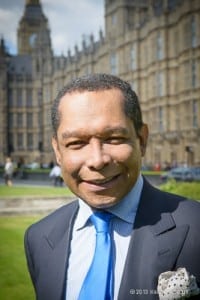
He was born John David Beckett Taylor in 1952 to Jamaican immigrants in Birmingham - his father, Derief Taylor, was a professional cricketer who played for Warwickshire and the West Indies, his mother Enid was a nurse.
From head boy at Moseley Grammar School in 1971/2, he studied English literature and law at Keele University followed by the Inns of Court School of Law in London. He was called to the bar in 1978, when he joined the same chambers as Justice Secretary Ken Clarke.
There followed a varied career, including a stint as a special adviser in the Home Office between 1990 and 1991, as a TV and radio presenter and he ran a PR company - Warwick Communications.
In 2002 he launched an unsuccessful bid to become BBC chairman, suggesting its shows were "boring and bland".
Having become politically active as a councillor in Solihull in the 1980s, he chose the Conservative Party as his political home - saying he believed Labour's attitude towards black people was patronising.
But he was to take issue with his own party over its own attitude to race - challenging successive Tory leaders over their response to racism within their own ranks.
Cheltenham had been considered a Conservative safe seat but it was lost to the Lib Dems by 1,668 votes in 1992, after a campaign in which John Taylor was subjected to racist abuse by some local Tories.
In 2001 there were rumours he might defect to Labour over a race row surrounding the then Conservative MP John Townend just before the general election.
'Right-wing element'
Lord Taylor threatened to leave the party over then leader William Hague's "pathetic" response to remarks by Mr Townend, who had suggested immigrants were undermining the UK's "homogenous society".
He accused Mr Hague of being "frightened of a certain right-wing element" within the party.
He stayed with the Conservatives but remained critical of its response to race rows.
POLITICAL CAREER
1986-90: Councillor in Solihull
1987: Tory candidate for Birmingham Perry Barr
1990-1: Special adviser to home secretary and ministers
1992: Tory candidate for Cheltenham
1996: Made life peer by PM John Major
2010: Resigns Tory whip after being charged over expenses
In August 2001, in the wake of another row about Edgar Griffin - father of BNP leader Nick Griffin - and one of the people on Iain Duncan Smith's Tory leadership campaign, he warned race was "a cancer that is in the body that will spread and eventually kill the Conservative Party".
In 2002 he called for Tory frontbencher Ann Winterton to be sacked over a racist joke - when she was, he warned that the party was simply "putting a sticking plaster on a wound - they can't just wait for the next wound to erupt".
Stories about his expenses surfaced in the Sunday Times in August 2009.
He later resigned the Tory whip after being charged with expenses fraud and has was found guilty of making £11,277 in false claims.
Southwark Crown Court heard he claimed travel costs between his Oxford home and Westminster, as well as subsistence for staying in London.
He said he had made the false claims "in lieu of a salary" and had been acting on the advice of colleagues, but the jury found him guilty by an 11-1 majority verdict.
He was later sentenced to 12 months in jail for his offences.
Source: BBC News
David Turner
Dramatist
David was a British playwright born in Birmingham on 18th March 1927 and attended Moseley Grammar School. After leaving Moseley David Turner studied French at Birmingham University and subsequently worked as a school teacher in Birmingham. He is best remembered for his stage play Semi-Detached, first performed during 1962, which reached Broadway and was made into the film All the Way Up (1970). He prepared modern versions of classic plays including John Gay's The Beggar's Opera, a version seen in London in 1968, and The Miser by Molière, which was performed at the Birmingham Rep in 1973.
An early opponent of the 'Clean-Up TV' founder Mary Whitehouse he interrupted, as an audience member, the meeting in April 1964 at Birmingham Town Hall which first brought her to national attention in Britain accusing Mrs Whitehouse of attacking creative freedoms. The creator of Swizzlewick (BBC 1964), a twice weekly comedy drama, he wrote an episode of the series featuring possibly the earliest parody of the morality campaigner. Way Off Beat, another suburban comedy like Semi-Detached, was transmitted as part of The Wednesday Play anthology series in June 1966. Critic John Russell Taylor thought Turner had "revivified the Jonsonian [Ben Jonson's] comedy of humours".
Turner was for a time a scriptwriter on The Archers, the BBC radio soap opera. He also adapted literary works for television. A five part version of Germinal, from the 1885 novel by Émile Zola, was transmitted early in 1970 and Roads to Freedom (also 1970) was a thirteen part adaptation of the novel of that name by Jean-Paul Sartre. Both were nominated for several BAFTA awards including one for Turner's version of Sartre's work. He also wrote versions of Stella Gibbons' Cold Comfort Farm (1968) based on her comic classic and North and South (1975) from the 1855 novel by Elizabeth Gaskell.
David passed away on 11th December 1990 (age 63) in Leamington Spa, Warwickshire, England, UK
Source: Wikipedia
Martin Woodhead
Professor of Childhood Studies

Martin Woodhead
Left Moseley Grammar School in 1968 and went on to study for a BA (Hons) in Psychology at Manchester University, and then an MA in Education at Leicester University. After several years full time educational research, I joined the Open University’s lecturing staff in 1977, completed my PhD and spent many happy years working on the Open University’s pioneering courses in child development, education, and more recently childhood and youth studies, including writing textbooks, and making the tv programmes and videos.
I am now Professor of Childhood Studies and concentrate mainly on research, writing and advisory work. I have always been especially interested in young children’s development, education and care, and I was the adviser to a major TV documentary series about childhood around the world, called “All Our Children”, which was first broadcast on BBC1 in 1990. A lot of my work has been international, about how to improve the quality of children’s lives, their health and their education in some of the world’s poorest countries. I am co-editor of 'Children & Society', which is one of the main academic journals in my field of research, and I am a member of the editorial board for another leading journal called 'Childhood'.
Since 2005 I have divided my time between the Open University and Oxford University where I help direct a major research project, funded by the British and Dutch governments. Called 'Young Lives', it is a 15 year longitudinal study, tracking the development of 12,000 children growing up in poverty in Ethiopia, India, Peru and Vietnam www.younglives.org.uk. I have also had plenty of practical experience along the way, including four children, and now three young grandchildren.
Some of my most interesting recent work has been about the implementation of the United Nations Convention on the Rights of the Child, 1989, including ‘ghost writing’ the UN Secretary General’s annual report on children’s rights, delivered to the UN General Assembly in New York in 2010.
I do wonder how far these interests in improving children’s lives and education were kindled during my formative years at Moseley?
Clare Edwards
Musician
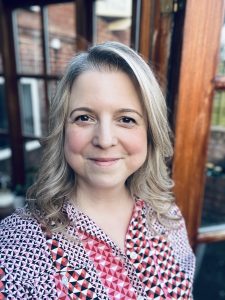
At Moseley I got involved in amazing musical productions like Kismet and King and spent many a happy lunch hour in the music suite - just making music with friends or working out tunes on one of the pianos in the practice rooms. After much encouragement from Martin Bates, I ended up playing the Clarinet, Bassoon and Piano and learning to sing in and lead choirs… this was what I would spend my life doing…
Since those days I have dedicated my career to singing and supporting and working with musicians and music organisations. From my first job with the City of Birmingham Symphony Orchestra in their education department to my role now at Young Voices. I have combined my passion for music with work that encourages others to get involved in music making.
I have been lucky enough to work all over the world - including the USA, Russia, Europe, the Middle East, India and South Africa doing everything from performing, producing and speaking engagements. I’m aware that music has opened these doors for me and I have met many many amazing people along the way.
My work has been recognised over the years too. I was overall winner of The Birmingham Young Professional of the Year in 2007, UK Young Music Entrepreneur in 2008 and most recently awarded the Lady Hilary Groves Prize 2017 Winner for Outstanding Contribution to Music in the Community.
At Young Voices I am Director of Learning and Events which in short means I work with the creative team to produce all the musical resources, the related teacher training and then produce our annual tour of arenas in the UK and US. I feel privileged to be part of an organisation that introduces thousands of children every year to the joy of singing. This year we have also released a charity single with Heather Small to raise funds for Place2Be - a charity that delivers children’s mental support in schools.
I have continued my own music through choirs and still sing with Ex Cathedra when I can - the annual candlelight concerts being a particular favourite of mine.
I also started my own choir in 1997 called Notorious. At the time it was to create a choir for young professionals who did not want to just sing established choral works, but who wanted a range of genres and generally more relaxed approach to rehearsals to fit around their busy schedules. We also committed to performing in unusual places and 25 years of we can still say we do, having presented concerts in pubs, galleries, a coffin factory and in caves while the audience watch from boats!
I continue to be active in the local Birmingham community too as Deputy Chair of the Acocks Neighbourhood Forum and on the Board of Arts in the Yard - the community organisation born out of the local arts forum in Yardley. I love living in Birmingham and representing our great city on my travels including the Young Voices concerts in New York.
Lee Benson
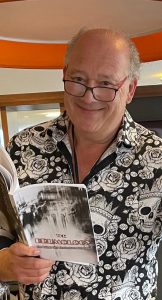 Author, Musician and Fellow of the Royal Society of Arts
Author, Musician and Fellow of the Royal Society of Arts
Lee was part of the DB Gaskin era and the last of the Grammar school pupils.
Lee writes "I was one of the eldest in my year with most my peers in the year above so it was a new bunch of lads to meet up and an unusual lot we were too. Not only did I have to contend with being large and built for comfort as my mom would say, but my first cousin was top at cricket rugby and whatever else the school athletics provided for. I was nothing like my first cousin. However, we did raise the most money for the school with charity ideas and I did enjoy chess, learning bridge (oops maybe shouldn’t mention that) and other non-sport activities. I mean why would one jump hurdles They were never going to add to my years after school.
One of the nicest things to happen several years after leaving school was when I walked by DB Gaskin in Moseley village and he called me by my surname. I asked him how did he remember my name. He replied you were very difficult to forget. Now that’s an achievement. As to my school reports mostly saying I could do better, well now I have three novels eight books of poetry and 12 children’s books published so yes, I will now say I have done better. May I add I had a single in the charts in the eighties.
You can find all Lee's published works on poetry, children's tales and adult stories not forgetting some great discographies by visiting www.andrewsparke.com/lee-benson
Mirsad Solaković
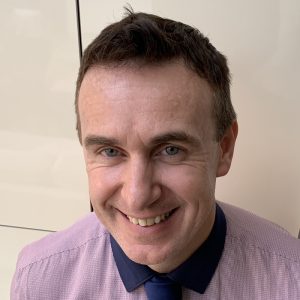 Author, Actor
Author, Actor
Mirsad Solaković was both a student and later a drama teacher at Moseley School arriving in Birmingham as a refuge from Bosnia aged thirteen in 1992.
In 2018 Mirsad self-published a book telling his story and including some of his poetry based on his experiences of the Bosnian war which raged from 1992 to 1995. His book “The Boy Who Said Nothing” has become a bestseller and is a poetic account of the Bosnian and Herzegovinian tragedy from his own devastating childhood experiences of war in the former Yugoslavia to his views of hope and peace for the future as an adult. Mirsad describes the horrific crimes which occurred during the war as well as his own mental struggle. It is also an uplifting account of just how effective good teachers can be when faced with deeply troubled pupils.
Mirsad Solaković was born into a very successful family in Kozarac in Bosnia, and was only thirteen when war broke. His family were taken to a concentration camp set up in his own school where Mirsad was tortured and tormented by his Serbian schoolteacher. He witnessed many atrocities and lost close family members, and having survived these events, was left with psychological damage. Having fled the camp, with his family he made the hazardous journey to the relative safety of Croatia, and then made the difficult decision to come to the UK as refugees.
At such a young age Mirsad was already suffering from post-traumatic stress disorder and struggled to settle in England until he was encouraged by some very supportive, dedicated and sympathetic teachers at Moseley School, particularly the English as a Second Language (ESL) Department who helped to rebuild him.
Mirsad developed an interest in acting, which helped him to overcome his nightmares and flashbacks. He earned a place at Coventry University and was awarded a BA (Hons) degree in Theatre Studies and Professional Practice before training at Birmingham School of Acting. Mirsad's early acting roles centred on the Bosnian war, including playing parts as a victim of war and a soldier. Alongside his acting career he qualified as a teacher and taught at Moseley School for several years inspiring many pupils with his story.
In 2013 Mirsad appeared for the first time in a Bosnian film: Ja sam iz Krajine zemlje kestena, playing a native Northerner. He has also appeared in a Bollywood film: Yamla Pagla Deewana 2 and appeared on British TV.
Paul Molesworth
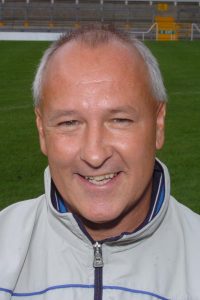 Football Scout
Football Scout
Paul Molesworth, Who attended Moseley from 1969 to 1975, began his scouting career working for Liverpool FC as chief scout for the Midlands area, a position he held for over 11 years. Paul has worked as a chief scout through all levels of English football including Swansea City, Port Vale, Kidderminster Harriers, Greenock Morton, Luton Town, Mansfield Town, Oxford United and Northampton Town. As a player Paul was an accomplished left back making professional appearances for Walsall FC in England, Hamarun Spartans in Malta and AEK in Cyprus.
Paul tells how on one occasion the then Anfield manager, Kenny Dalglish, was keen on attracting the likes of Scotland legends John Collins and the late Davie Cooper to Anfield in the second half of the 1980s. He said: “Every Thursday afternoon or Friday morning, by 11am at the latest, Ron Yeats, the then chief scout for Liverpool FC would call to confirm which game I was required to attend on a Saturday.
“On Friday I didn't hear from Ron, so I phoned his direct line and, sure enough, he answered in his very deep Scottish accent: 'Sorry son, I've nae forgotten ye, but we've got a wee problem and the boss (Dalglish) needs your help'.
“It turned out that Kenny was desperate to get an urgent report on two players he was really keen to sign and the designated scout couldn't get there to watch them.
“I asked him what he wanted me to do and he replied: 'Well son, the boss really trusts you, so we need you to go and watch John Collins and Gordon Hunter playing for Hibernian against Falkirk tomorrow'.
“Okay Ron, I'll go, but I'm head of coaching for the Midlands, mate.”
“He responded: 'Aye son, you're right and that's why you're going to the middle of Scotland'.
“I couldn't really argue with that, so next day, it was a 600-mile round trip from Birmingham to Edinburgh for me. I got to Easter Road at around 2pm, with just one stand ticket, no lounge pass, and they didn't have a team sheet, so I asked for a programme.
“This just listed a squad on the back, and the public address system was very poor, so I couldn't make out the names when the teams were announced to the crowd.
“I was sat near to the press box and asked one of the reporters for a quick look at the team list – and that's when I saw the Hibs line-up and there was no sign of Collins or Hunter.
“So I asked the journalist where they were and he told me: 'Just about to sit down next to you, pal. They're injured, they've both missed the last couple of games and aren't quite ready for this one, but they should be okay for next week'.
“That was brilliant news, all that long journey for frigging nothing. I said 'Hi' to the lads, but I obviously couldn't do any more than that. And it was terrible game, 0-0.
“Then, there was the trek back to exotic Birmingham and I arrived home after midnight. On Monday morning, I was straight on the phone to big Ron at Melwood and he asked: 'How did Collins and Hunter look?'
“I told him: 'Fine. They looked good, Ron, excellent dress sense in the cold conditions'.
“What the f*** are you on about, son?'
“They weren't playing Ron, they were both injured and have been out for a few weeks'.”
“He was quiet for a minute. Then he said: 'Och, you're joking me'. And that was that. But at least I filed a report about Mickey Weir and he signed a few weeks later – for Luton Town!”
Paul is currently director of football at Bromsgrove Sport FC. He said “This will be my last football project. I've dropped out of professional football to do this, mainly because it's my local team and I want to help get them back up to where they were back in the early 1990's. My dad actually played for them back in the 1950's (he used to get three buses from Birmingham to get there) and two of my sons have also both played for them more recently. So, there's a touch of family affinity with the club historically too.”
Amerah Saleh
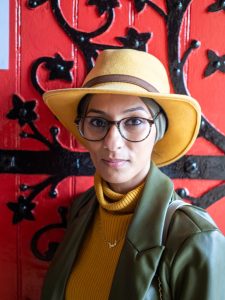
Spoken Word Artist
Amerah Saleh is a spoken word artist born who Attended Moseley School. Her Muslim Yemeni roots give her space to get lost and found on multiple occasions between identity. She is the Co-Founder of Verve Poetry Press. Amerah has performed all around Europe and has released her first collection called ‘I Am Not From Here’ in April 2018. Her work touches on identity, womanhood, religion and the obscure idea of belonging only to one place.
Professor Ian D. Whittington
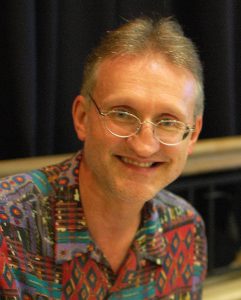 Fellow of the Australian Society for Parasitology
Fellow of the Australian Society for Parasitology
Ian Whittington was a recognised internationally as a specialist on monogenean parasites of marine fishes. He pursued innovative studies of whole parasites to understand parasitism in relation to structure, ecology, evolution, behaviour, life history, systematics and taxonomy and that of their hosts. In particular he used monogenean parasites as models to examine events at host-parasite interface, to draw conclusions as to how parasite larvae recognise their hosts and choose specific sites in/on their hosts. During 15 years at the University of Queensland he built and led the Monogenean Research Laboratory, the only Australian research team working on this group of fish parasites. Whittington made many overseas trips to further study monogeneans and led 40 major research projects to completion. In 2002 he was appointed jointly to the Department of Zoology, University of Adelaide, and Head of the Parasitology Section, South Australian Museum. International journals for which he served on editorial boards include Systematic Parasitology, Folia Parasitologica, Journal of Natural History and Acta Parasitologica. Whittington donated Monogenea specimens to both the Australian Helminthological Collection at the South Australian Museum and the Queensland Museum.
Ian David Whittington completed his PhD at the University of East Anglia, UK in 1986 with Dr Graham Kearn, a leading authority on Monogenea. Ian moved to Queensland, Australia, in 1987 where he worked at the University of Queensland (UQ) in Brisbane as a Postdoctoral Fellow in the School of Biological Sciences. He won a prestigious Queen Elizabeth II Fellowship in 1990 and continued his work in the Department of Parasitology at UQ before accepting a Lectureship at the same institution (1993-1996). He maintained high research productivity during his Directorship of UQ’s Heron Island Research Station (1996 to 1999) and was appointed to Senior Lecturer in 1997. During his 15 years at UQ, Ian built and led the Monogenean Research Laboratory – the only Australian research team dedicated to the study of monogeneans. In July 2001, his group had the honour of hosting the 4th International Symposium on Monogenea, demonstrating significant international recognition for Ian’s research during his early to mid-career.
In January 2002, Ian moved his research group to Adelaide, South Australia, for a joint appointment as a Senior Research Scientist at the University of Adelaide and head of the Parasitology Section at the South Australian Museum (SAMA). In 2006, he was promoted to Associate Professor/Principal Research Scientist. From 2012 he worked as Head of Biological Sciences at SAMA and was actively engaged in research and administrative duties until his death.
Ian promoted innovative studies of whole parasites to understand parasitism in relation to structure, ecology, life history, systematics and taxonomy and that of their host(s). His holistic studies on live parasite biology, behaviour, life cycles, systematics and evolution included many significant contributions.
Ian published more than 170 peer-reviewed papers over his career and led 25 major research projects (ARC Large, Discovery, Small & Linkage grants) to completion. Ian attracted many students and colleagues through his expertise and knowledge of marine parasites, humorous nature and welcoming personality. He was a dedicated mentor, lecturer and supervisor and provided a supportive, professional environment conducive to productive science and promotion of excellence and exceptional quality. Over his career he supervised and graduated 9 PhD and 16 Honours students and mentored 6 postdoctoral fellows. Many of his former students now work in senior roles in aquaculture, academia and government. He received several notable awards during his career including a Queen Elizabeth II Fellowship (1990–1992), a Visiting Professorship Centro de Investigaciones Biológicas del Noroeste, La Paz (2006) and the prestigious Fish Parasitologist of the Month (http://www.diplectanum.talktalk.net/fish/).
Ian’s research is well respected internationally and he made considerable contributions to the field through service. He received more than sixteen invitations to speak about his research at national and international conferences and contributed more than fourteen invited peer-reviewed publications. He acted as a grant assessor for numerous national (ARC [IntReader], ABRS, Australian Academy of Sciences) and international (Canada, Czech Republic, Scandinavia, South Africa, UK, USA) schemes. Ian served on the Editorial boards of numerous scholarly journals.
Ian Whittington will be remembered as an inspirational mentor, who changed and shaped the lives of his students and had the admiration and respect of his colleagues. Ian’s contribution to the study of the Monogenea, his dedication to training and supporting early career researchers and his service to the ASP make Ian David Whittington worthy to be elected Fellow of the Australian Society for Parasitology.
Ian died on 27 October 2014.
Moeen Ali OBE
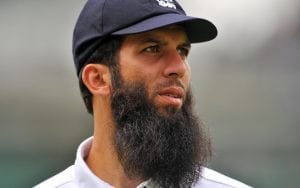 Intentional Cricketer
Intentional Cricketer
Moeen Ali OBE was born in Sparkhill and attended Moseley School in the late 1990s and early 2000s.
Moeen is fondly known as 'the beard that's feared'. He was a teenage prodigy and destined for success due to his extraordinary skill-set. Moeen was signed by Warwickshire as a 15-year-old and he didn't waste time in impressing one and all.
Ali also captained England in the 2006 under-19 World Cup and took his team till the semi-final. Due to limited opportunities at Warwickshire, Moeen switched to the rival county team, Worcestershire. He played a vital role in his side winning the Pro-40 title in 2007 and one of his knocks, a blazing 46-ball century, was much-talked about. After working hard in the domestic circuit and showing his all-round abilities, the national selectors finally picked him for the ODI series against West Indies and the World T20 that followed.
It didn't take long for Moeen to break into the English Test team and that was also helped by the untimely retirement of Graeme Swann. His elegance with the bat and ability to bowl useful off-breaks played a big role in his selection. Ali made his Test debut against Sri Lanka at Lord's and in his very second Test, he almost saved the match for his team with a valiant century.
Considered as a part-time spinner, Moeen's career graph in Tests jumped to another level when he picked 19 wickets against the touring Indian team and surprised many. Always open to learning, it was later known that Ali benefited from the technical advice from Kumar Dharmasena, who was an umpire in the series. Post that, his Test career went from strength to strength and he established himself as a key member of the England unit. His career in the limited-overs cricket also went well side by side where he usually batted in the top order. However, things changed after the 2015 World Cup debacle and the selectors left him out of the ODI team so he could work on his red ball bowling.
The emergence of Alex Hales and Jason Roy at the top of the order increasingly made it tough for Moeen to get his place back but he never lost hope. Soon, he was picked by the selectors with a new role to bat in the lower order and his useful bowling worked as a plus point. In the year 2017, against the visiting South African team, Moeen Ali created a record by becoming the first player in Test history to take 25 wickets and score 250-plus runs in a 4-match Test series.
Coming to his domestic exploits, particularly in the Indian T20 League, he was picked up by Bangalore for the 2018 season but was not given a chance straightaway as Bangalore had some good all-rounders in their ranks but he was given a chance in the 4th game of the season, and he accepted this chance gleefully as he went onto score a match-winning knock of 64. His consistent show, whenever given a chance, prompted Bangalore to retain him for the 2019 season, where he was once again good and struck 2 fifties for his side. He was not used much in the 2020 season and RCB let go of him for the 2021 auction, where Chennai picked him up for a whopping INR 7 crore.
Moeen announced his retirement from Test cricket in 2021 but returned to bat and bowl for his country in the Ashes series against Australia in the summer of 2023.
Source: sports.ndtv.com
Glyn Samuel
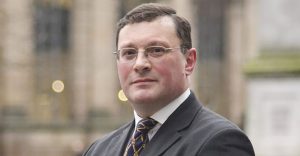 Chancellor of the diocese of Coventry
Chancellor of the diocese of Coventry
Glyn Samuel attended Moseley School from Easter 1981, when he moved to Moseley from Yorkshire, until July 1987. He was deputy head boy on 1986-1987, a member of the 1st XV and a leading member of the fencing club. After leaving Moseley he studied law and qualified as a barrister in 1991. Throughout all that time, and subsequently, Glyn has been a regular worshipper at his local church and has twice been appointed churchwarden, the first time for nine years, so the established church has been an important part of his life.
In January this year it was announced that he had been appointed Chancellor of the diocese of Coventry and he was sworn-in on the Feast of Candlemas in February - but what exactly does that mean? Each diocese in the Church of England (and in the Church in Wales) has a chancellor, whose appointment follows consultation with the Dean of Arohes (the most senior ecclesiastical judge in the jurisdiction) and the Lord Chancellor. Chancellors are the judges of the Consistory Court, deciding upon matters affecting real property and valuable items owned by the church, upon matters affecting consecrated ground, including municipal cemeteries, and in effect upon planning applications concerning church land. For example, an exhumation from consecrated ground requires permission from the appropriate chancellor. The first chancellors were appointed by William the Conqueror, so it is one of the oldest surviving judicial offices in the jurisdiction. Chancellors also hold the offices of vicar general for the diocese in question (nowadays confined really to issuing marriage licences and having a role in the defrocking of bishops) and as official principal, the main legal adviser to a diocesan bishop. A chancellor is addressed in court as Worshipful Sir, or Chancellor, and is addressed in correspondence as 'The Worshipful'. Decisions of a chancellor are enforceable in the High Court and judgments are afforded a neutral citation, similar to those used in the High Court or Court of Appeal. In court chancellors wear the formal dress of the Chancery Court, so a silk gown with court coat, but on formal ceremonial days a full bottomed wig, lace jabot, silk stockings and silver-buckled shoes must also be worn. It is still reasonably unusual for junior counsel to be appointed as a chancellor - the majority of chancellors are either circuit or high court judges or have been appointed Queen's Counsel.
In case you are wondering, a chancellor sits as and when required, so it is a part-time appointment. A chancellor can also appoint a single deputy chancellor to cover cases that the chancellor cannot hear or when the chancellor is indisposed. Glyn was deputy chancellor of Coventry from 2010 until his appointment as chancellor. He has also been deputy chancellor of Leeds since 2016.


